PLURAL COMMONS
An environment where each person’s whole Self is welcomed, cared for, and seen as essential to the common good.
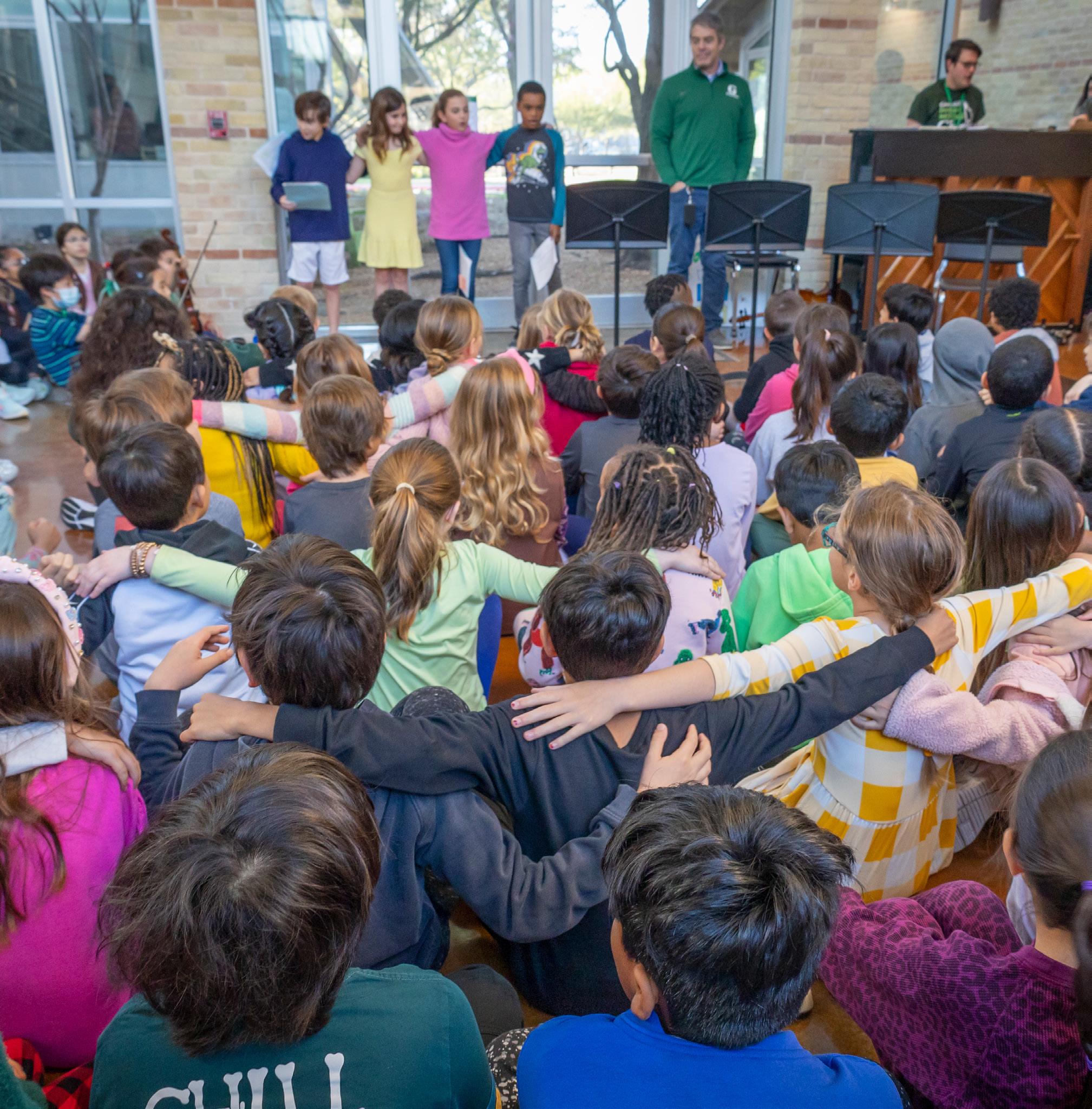
Digest / Spring 2023 A publication of Greenhill School
TRUSTED RELATIONSHIPS. WORTHY SURPRISES.
COMMONS
@PLURALCOMMONS WITH DR. INGRAM
Reflections from the Head of Equity & Inclusion Dr. Marcus R. Ingram.
DR. CLINT SMITH @PLURALCOMMONS
Upper School students engaged with Dr. Clint Smith over Zoom to discuss his writing.
AN ETHIC OF CARE
Dr. Siobhan Flowers writes about her experience supporting Greenhill educators during and beyond the global health pandemic.
ON LUNAR NEW YEAR
East Asian Affinity Group sponsor and Upper School Learning Specialist Grace Kiang reflects on celebrating Lunar New Year without fear.
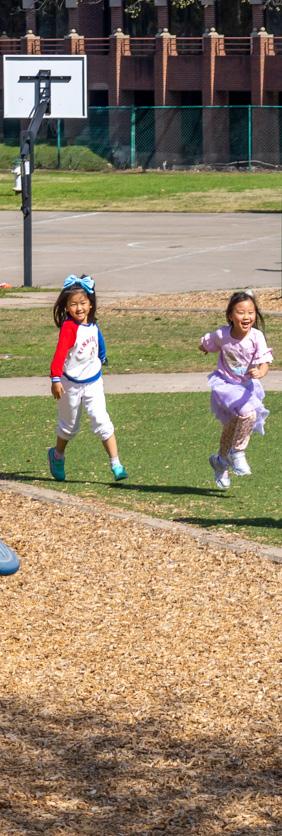
THE VALUE OF COMPASSION
Greenhill families discussed the connection between inclusion and compassion, a Greenhill core value.
NEW MEMBERS OF THE FAMILY INCLUSION COUNCIL
Meet the new members of the Family Inclusion Council.
LEADERSHIP: AN ORIGIN STORY
Lower School educators and students highlight the importance of leadership in the fourth-grade curriculum.
LEADERSHIP AS FINDING VOICE
Empowering Middle School students to become leaders by finding their voice and learning new skills.
AN AFFINITY FOR LEADERSHIP
Students in Affinity Group leadership roles were invited to take the CliftonStrengths assessment and receive coaching about their results.
GROUNDED LEADERSHIP
Greenhill’s Summer Enrichment Grant program inspired faculty to initiate projects that promote leadership in themselves and their students.
04. 10. 13. 06. 15. 05. 14. 09. 16. 18.
CONTENTS
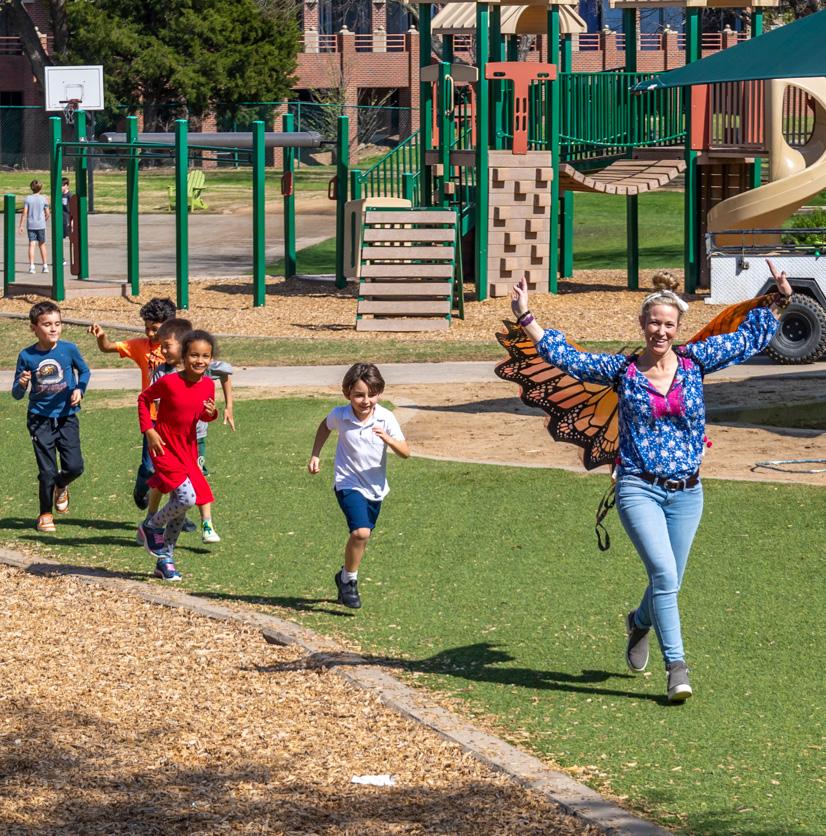 Above: Lower School students studied monarch butterflies and prepared for the migrating pollinators by growing milkweed plants in their garden and learning about the super-species.
Above: Lower School students studied monarch butterflies and prepared for the migrating pollinators by growing milkweed plants in their garden and learning about the super-species.
@PLURALCOMMONS WITH DR. INGRAM
Friends:
Recently, Dr. Clint Smith released his latest book, a collection of poems about the emotional gamut of parenting called Above Ground. In an interview with Stephen Colbert, he characterized poetry as the act of paying attention. As an educator, I believe that school life is essentially an invitation to pay attention – to students, to learning and teaching, to the world. So, if the transitive property of equality is relevant here (If a=b and b=c, then a=c), school life is indeed poetry.
Please receive this edition of the Plural Commons Digest as a poem – our exercise in paying attention to care, leadership, and voice this spring. In addition to a story about our hosting Dr. Smith, enjoy reflections from our students, staff, and families. May these verses and stanzas inspire curiosity, offer insight, and lift your hopes.
With care,
Dr. Marcus R. Ingram Head of Equity & Inclusion
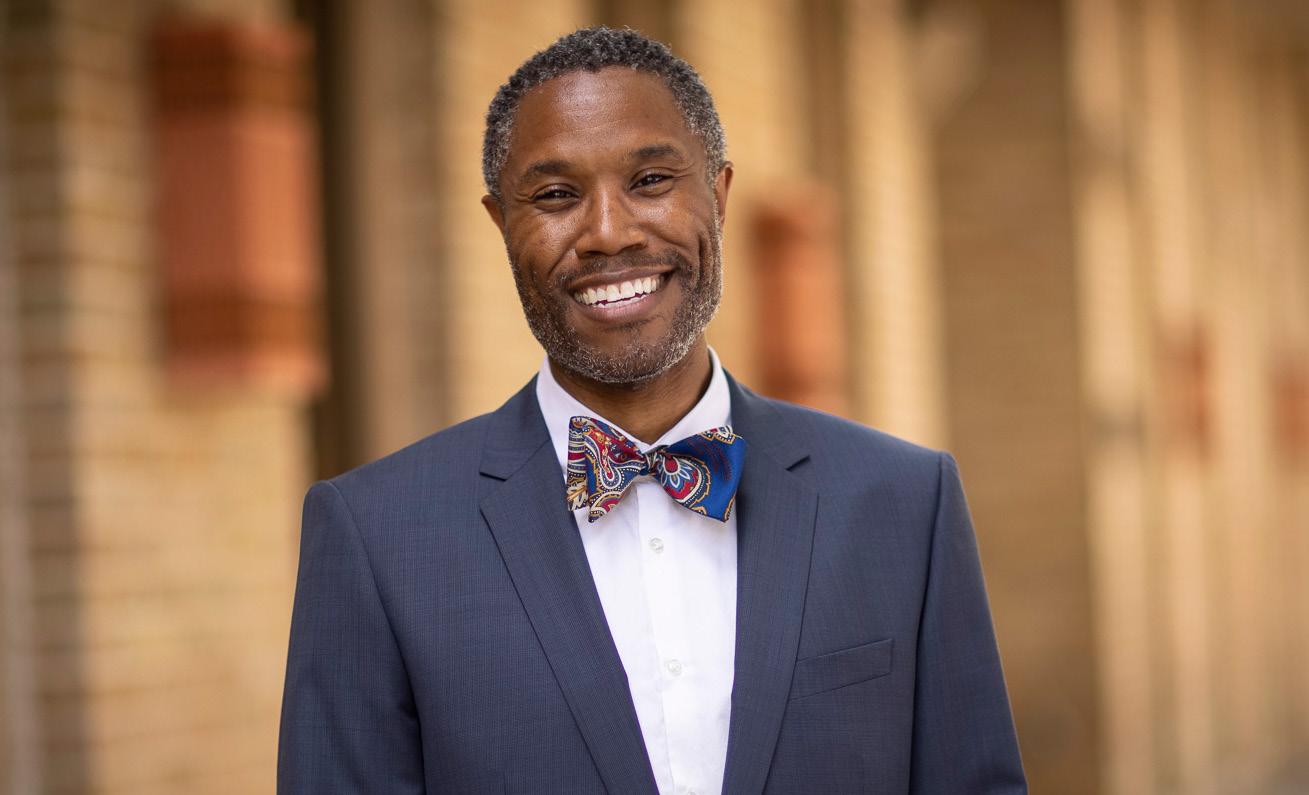
PLURAL COMMONS DIGEST 4
DR. CLINT SMITH @PLURALCOMMONS
Joel Garza, Upper School English Department Chair
At Greenhill, students benefit from tremendous academic freedom and available resources. Where some campuses and districts are removing books from shelves, our school is placing trust in our students. Our educators assign work by living authors that address our here and now in thoughtful, meaningful, artful ways. Poet and essayist Dr. Clint Smith is a quintessential example.
A renowned slam poet before he earned a Ph.D. at Harvard, a proud son of New Orleans who has traveled the world writing books as well as columns for The Atlantic, Dr. Smith is perhaps best-known on our campus as the author of the 2016 poetry collection Counting Descent. All ninth graders read
Counting Descent in English. When our Upper School English Department saw Dr. Smith’s powerful narrative essay “Monuments to the Unthinkable,” they knew that it was time to welcome students to revisit Dr. Smith’s work. Not only were they able to read Dr. Smith’s work, but they also had the opportunity to speak with him via Zoom about it.
In the recording linked here, Dr. Smith engages with our community on how Germany commemorates the victims of the Holocaust, on how monuments to enslaved people and to the Confederacy impact our national identity, and on how best to confront the past with honesty, with empathy, and maybe even with hope.
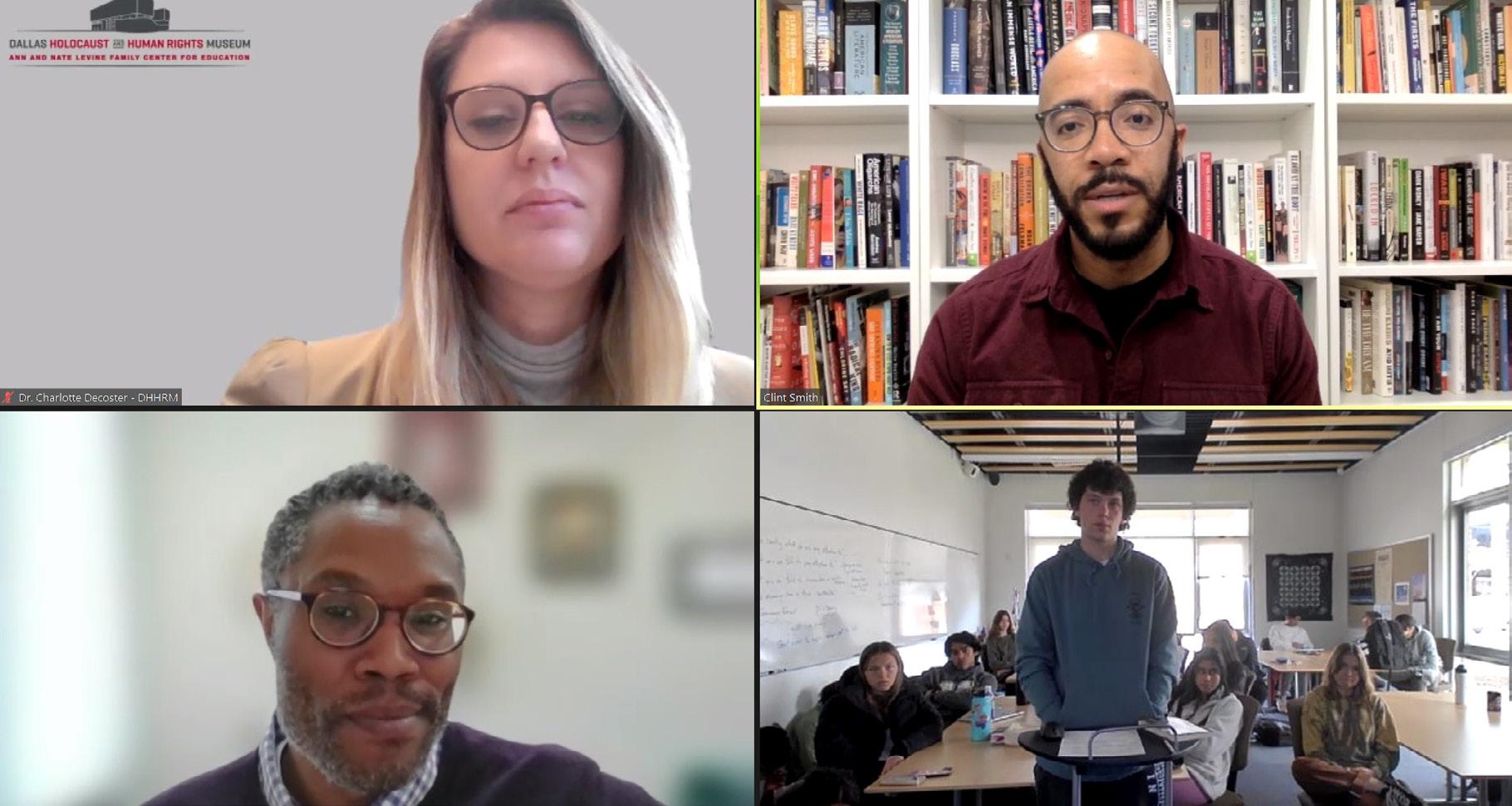
SPRING 2023 5
AN ETHIC OF CARE
Dr. Siobhan Flowers Balanced Vision
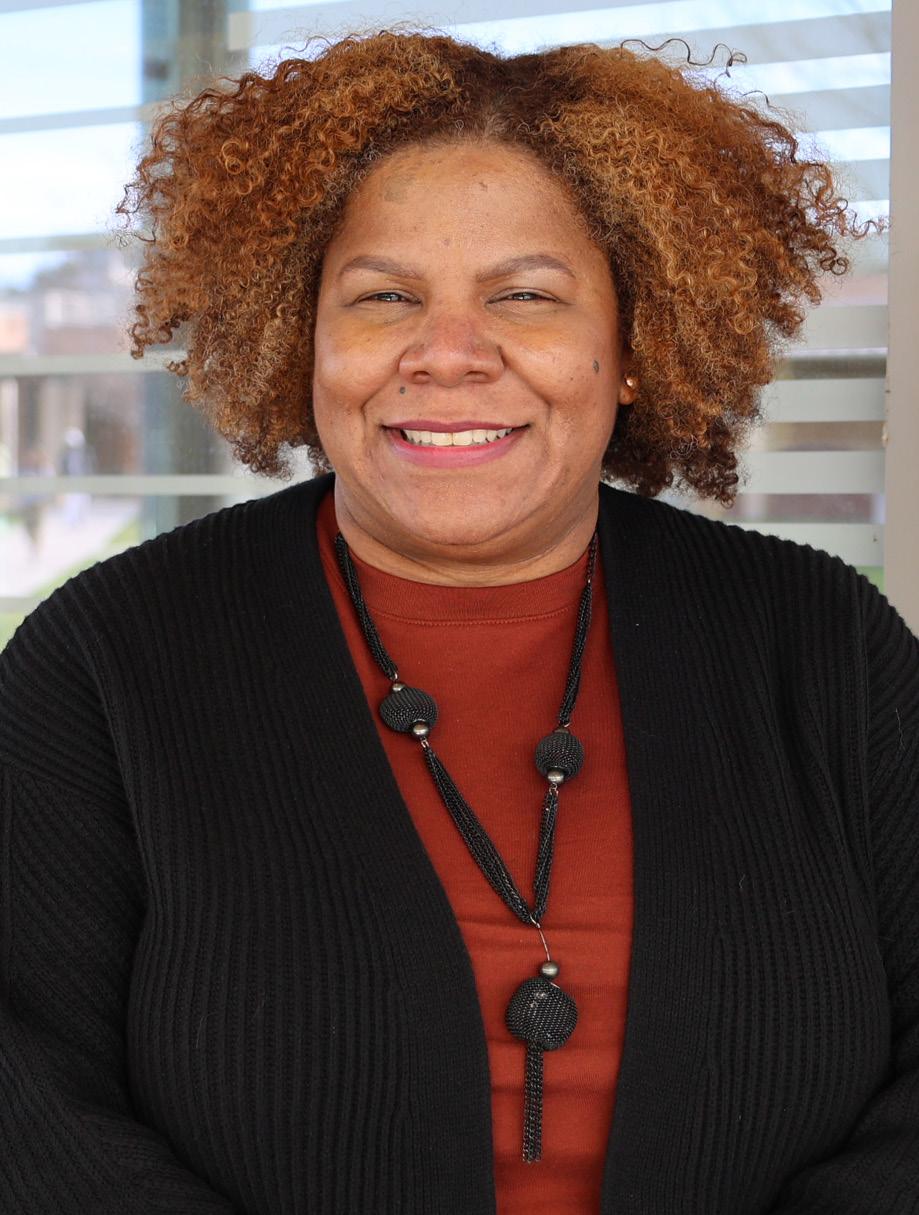
In 2020, Greenhill School invited Dr. Siobhan Flowers of Balanced Vision to lead a series of support sessions for our educators of color amidst the social upheaval surrounding the murder of George Floyd. Since then, Dr. Flowers has had other opportunities to engage with members of the employee community, exposing educators to practical tools for navigating their profession during and beyond the global health pandemic. She was eager to reflect on her experiences for this edition of the Digest
Why did you pursue counseling as a profession?
The idea of being able to provide a safe space in a warm, non-judgmental environment to help people coconstruct meaning and create significant change in their lives is something that has always been of interest to me. I truly believe in the transformative power of being able to tell your story to reconnect with yourself and others.
What should we know but likely don’t about your area/field of work?
That the space we hold for our clients doesn’t stop at the end of our scheduled time together. Like educators with their students, we (counselors) often think about our clients (both former and current) and hold space for them in our minds and hearts even when we’re not actively in session together.
What have you learned and/or gained from working with educators in recent years through a global health pandemic, punctuated social unrest, and heightened awareness of violence in schools?
The past few years have reinforced how important it is to see and acknowledge the ‘humanness’ of educators. Instead of wondering whether educators are ‘okay,’ it’s probably safe to assume that they are not okay and to extend as much patience, empathy, and grace as possible.
PLURAL COMMONS DIGEST 6
What is your message to educators as they show up daily to provide opportunity for students?
To not lose your own sense of identity in the process of educating your students. Teacher wellness can be directly tied to student achievement, so it is imperative that you prioritize your mental and emotional wellbeing.
What are ways that we might meaningfully show support to educators?
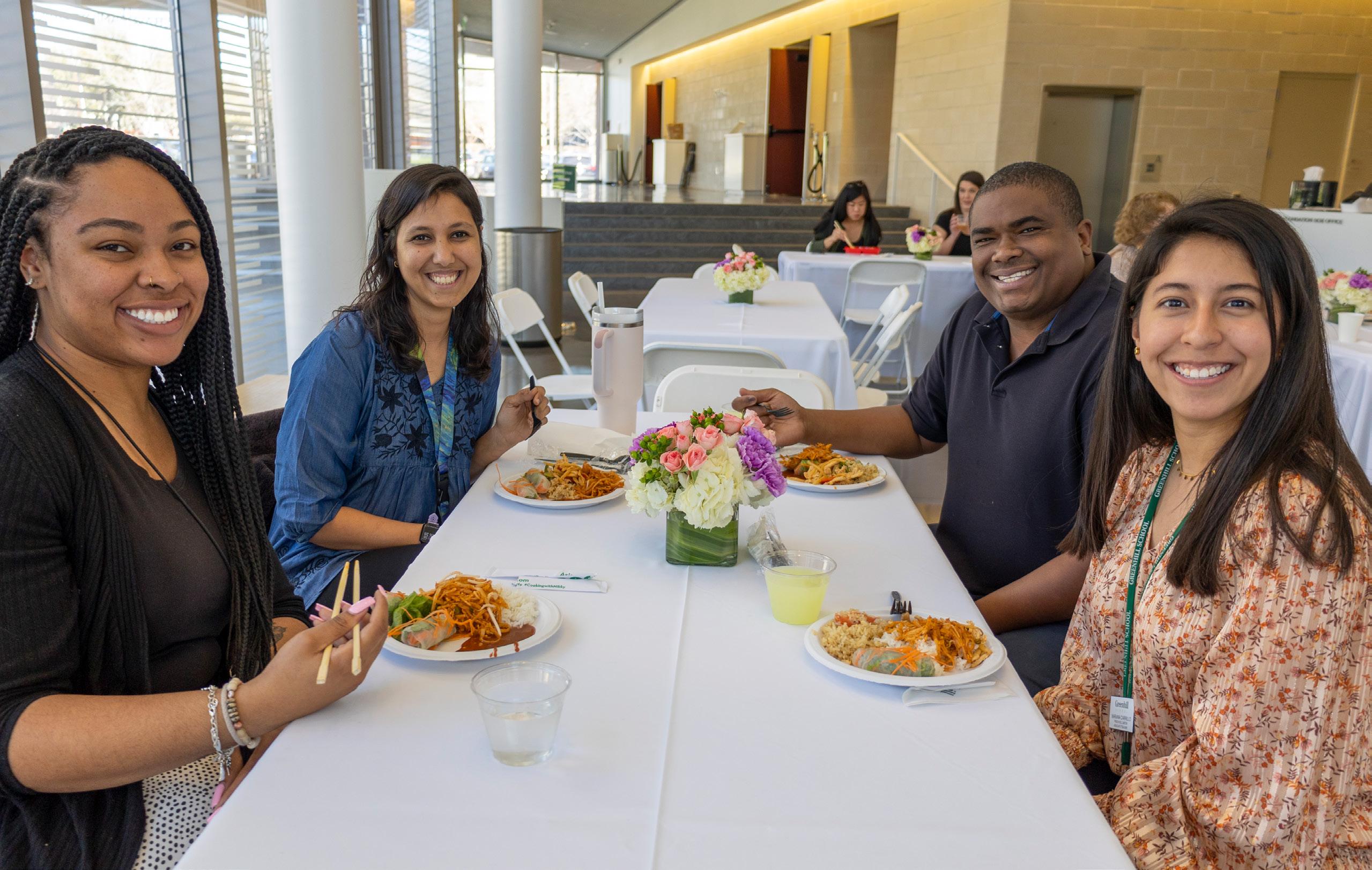
Provide spaces for educators to share their experiences, challenges, and ideas for improvement – and follow up on their feedback. Also, offer the gift of time whenever possible. Ultimately, prioritizing educator wellness alongside student achievement is a meaningful way to show support and promote a healthy school culture centered on respect.
What gives you hope?
As we begin to recalibrate from the stressors of recent years, I remain hopeful that the resilience and strength that educators have exhibited will continue. What we focus on is what grows, so it’s important to remain encouraged and trust in the transformative outcomes that result from seeking authentic connections and being in community with one another.
SPRING 2023 7
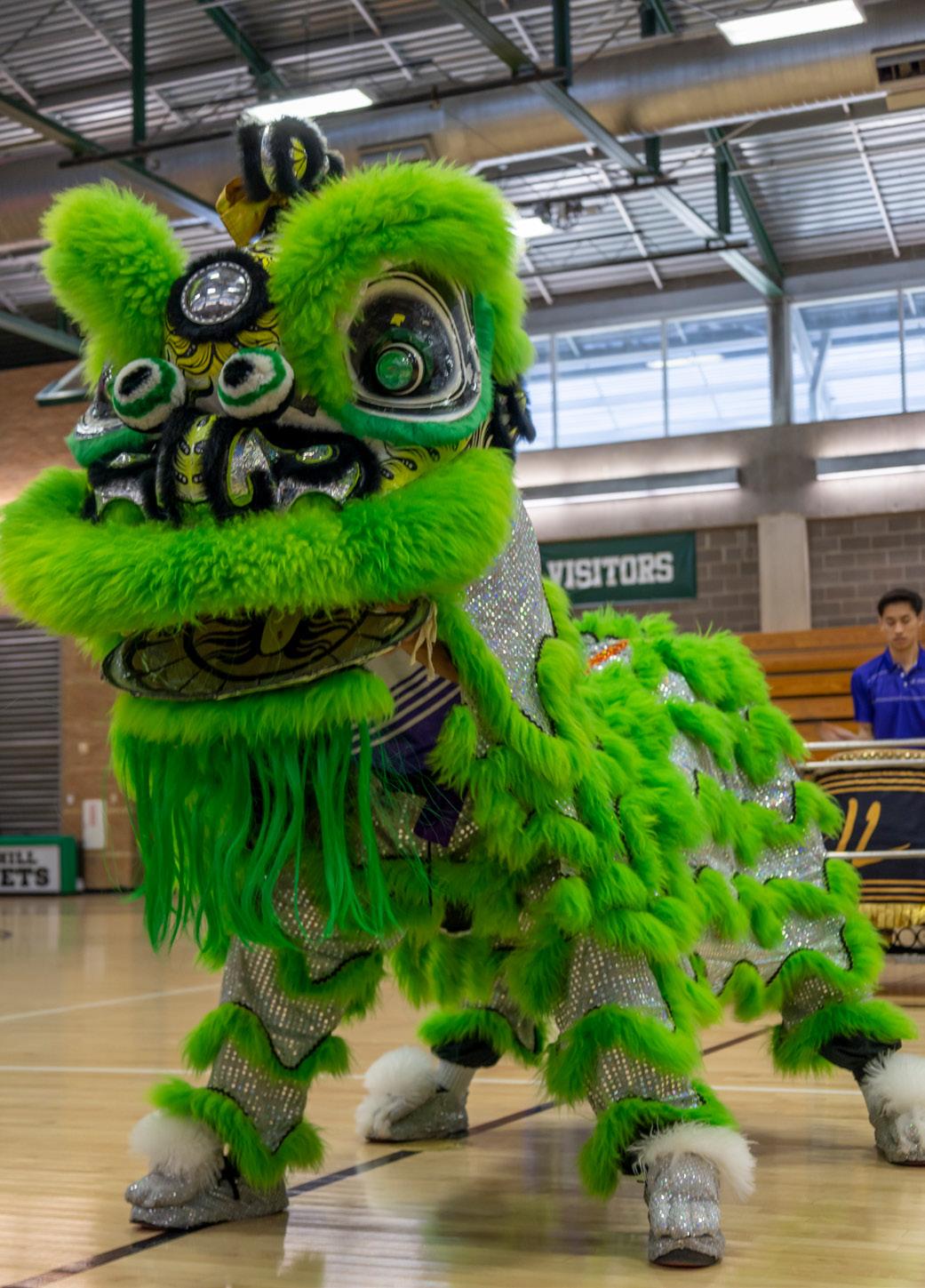
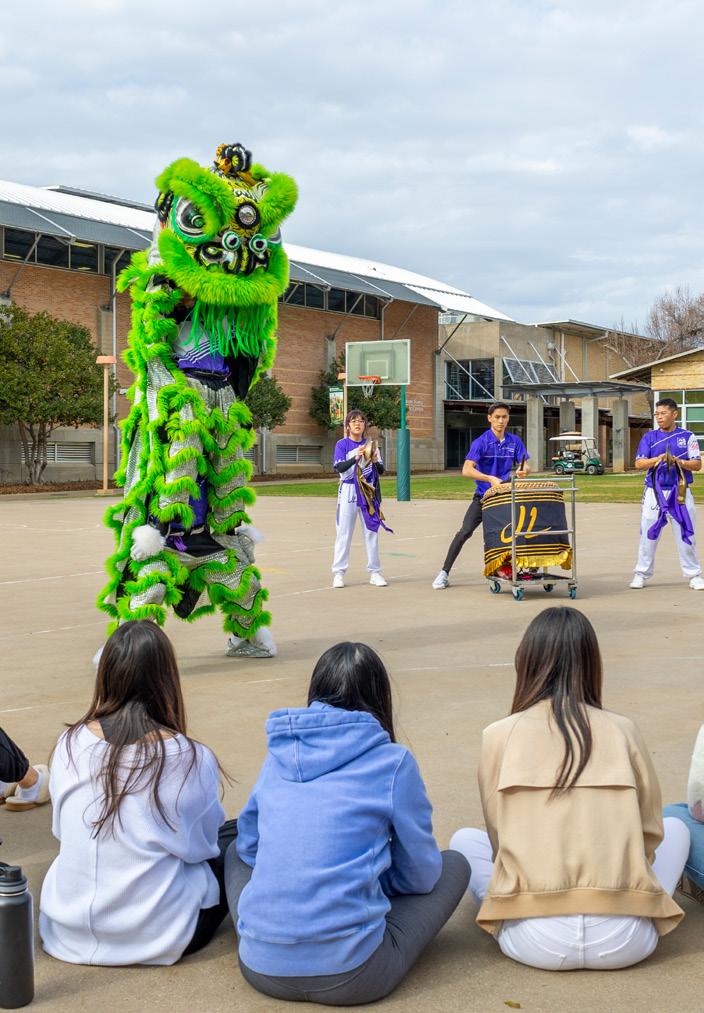
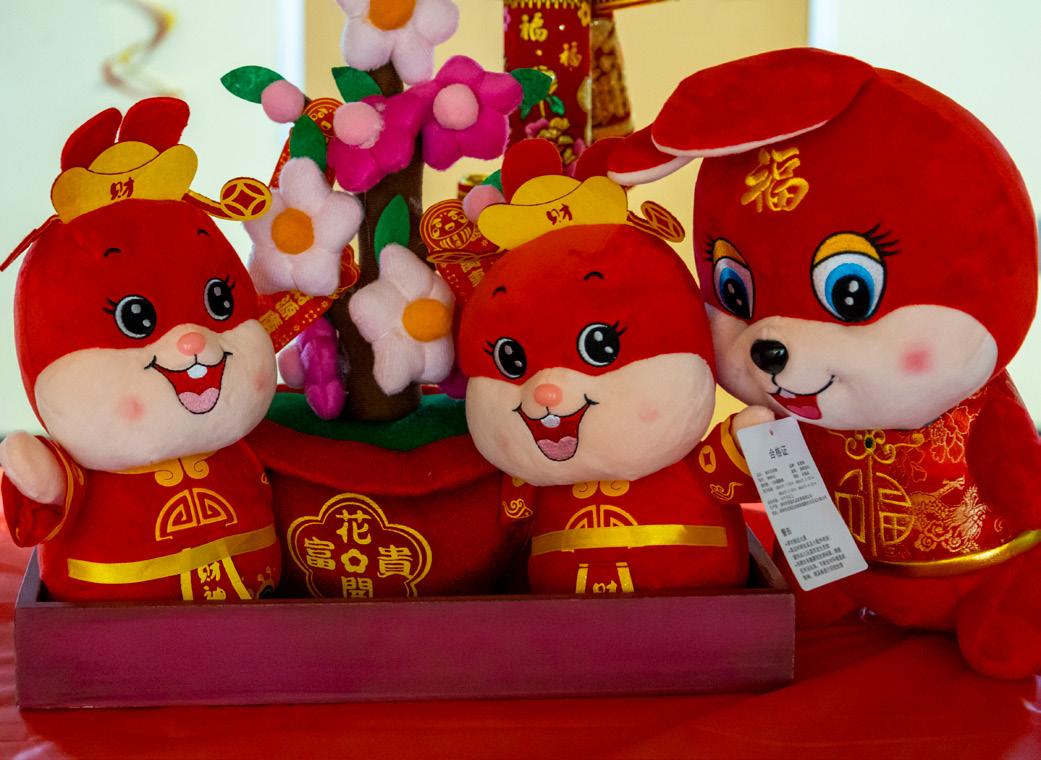
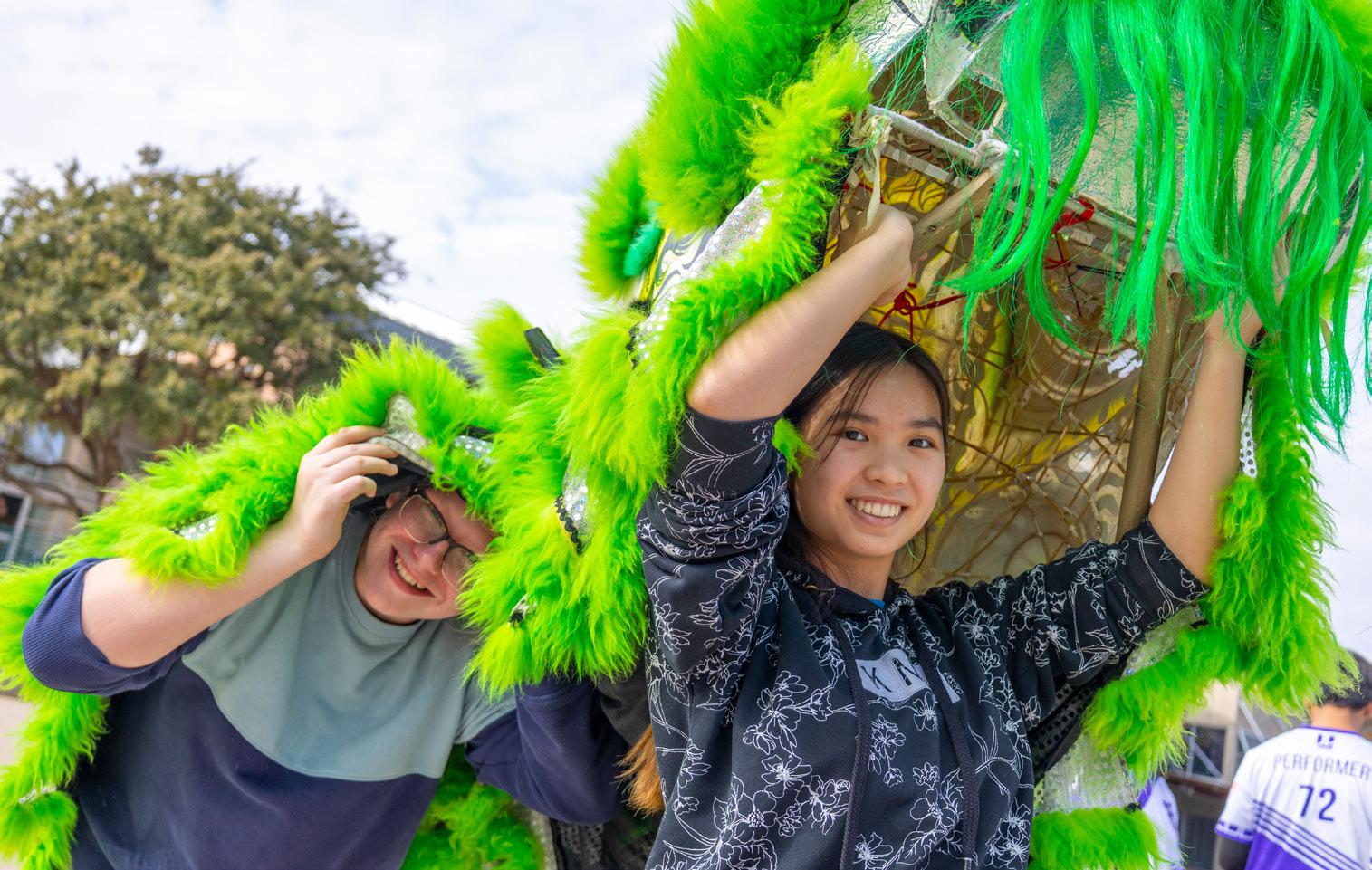
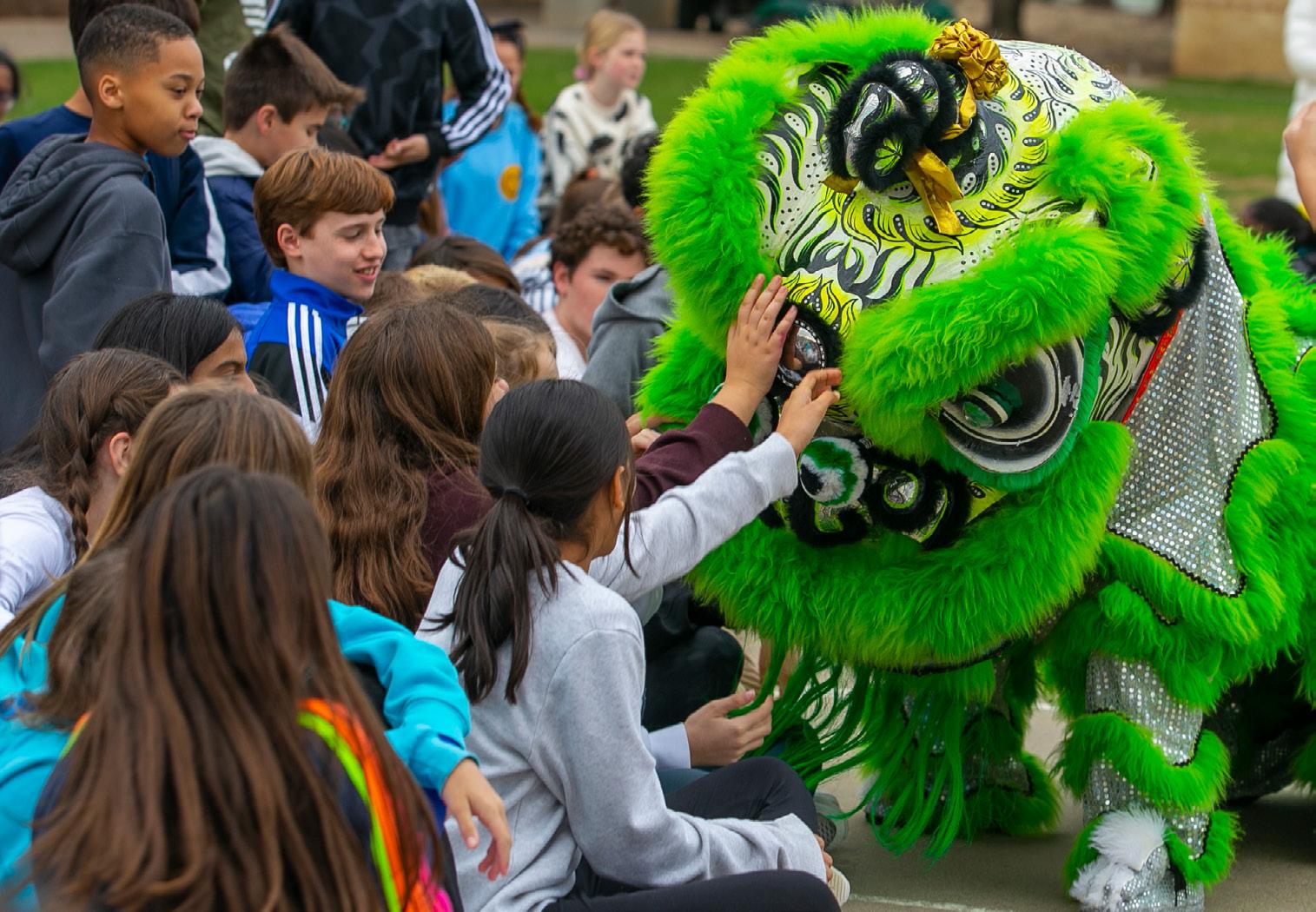
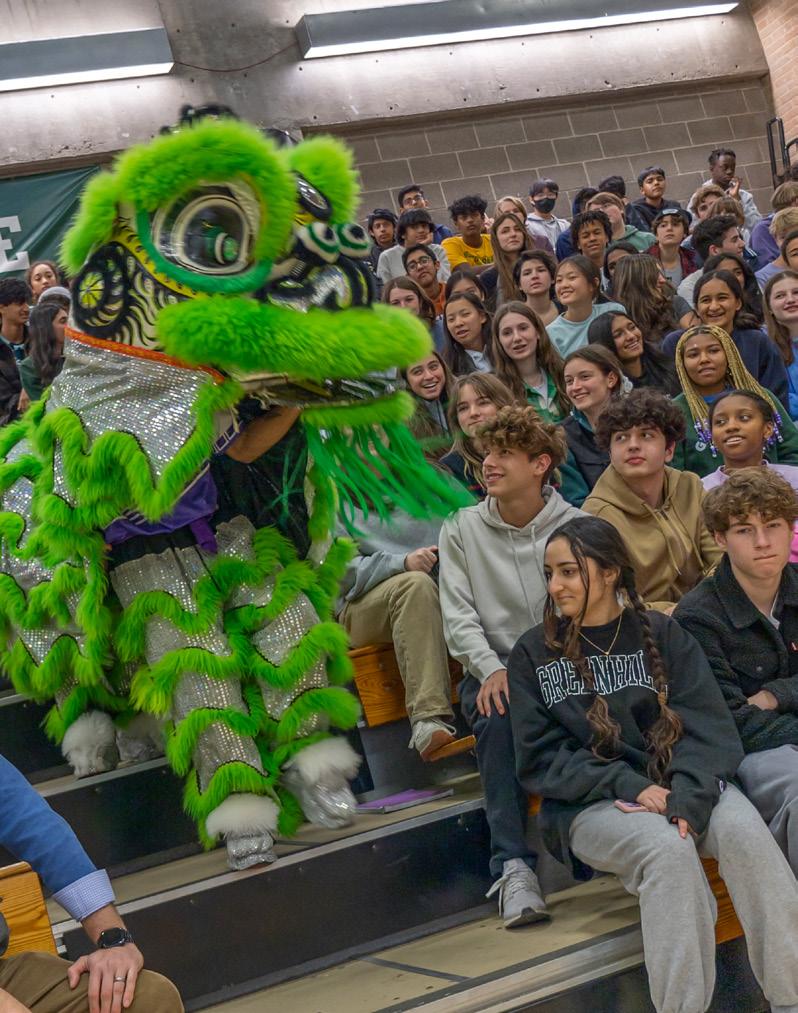
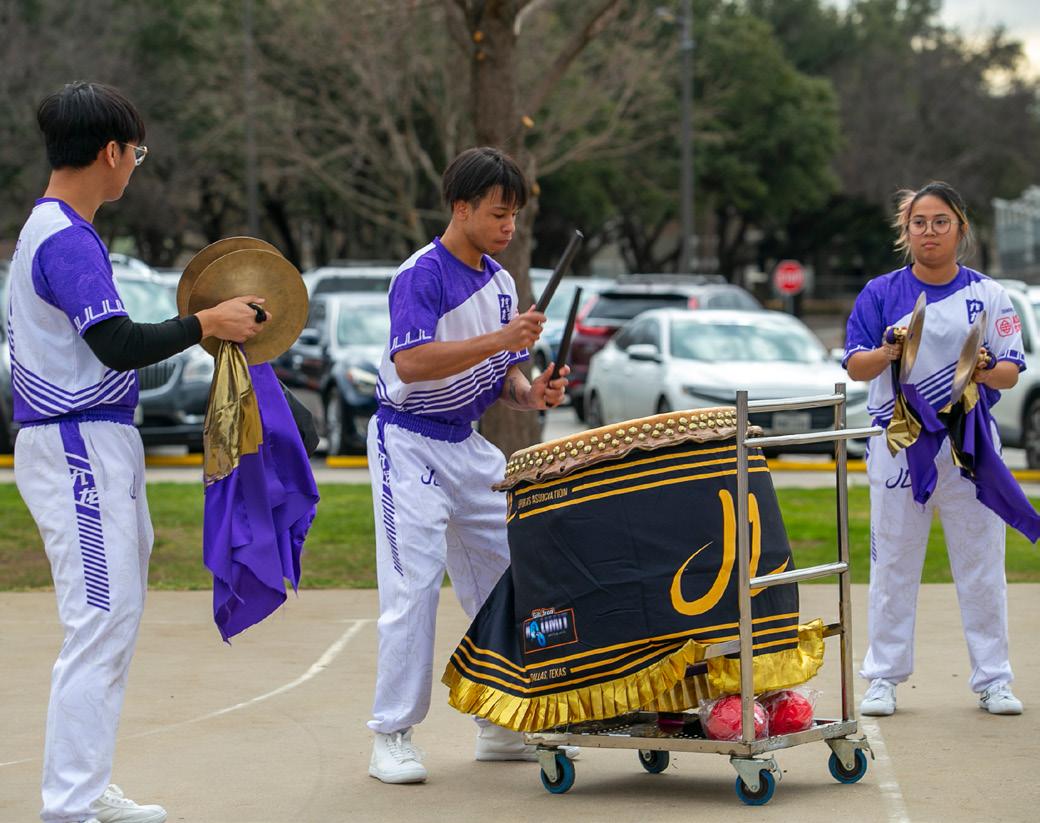
PLURAL COMMONS DIGEST 8
ON LUNAR NEW YEAR
Lunar New Year – a celebration marking the beginning of the lunar calendar and the onset of spring – fell on January 22 this year. Reds and golds, the cuisine, and family gatherings are welcome signals of the holiday for many East Asian and Southeast Asian households. And, thanks to our representative Affinity Groups, students (and staff) in our Upper School were able to enjoy festive decorations and lion dancing, as well as an educational assembly and savory luncheon during the week leading up to the new year.
In addition to the typical reflection that accompanies this annual transition, this year’s celebrations were scarred by the lingering challenges of anti-Asian hate and violence. When asked, affected students in our community amplified the importance of representation and being able to celebrate meaningful traditions like Lunar New Year openly in community without fear. Grace Kiang, adult sponsor of the East Asian Affinity Group and Upper School Learning Specialist, had this to say:
Lunar New Year is about renewal and honoring family. Symbolism is everywhere and an important part of the celebration. Ahead of the new year, seeing the school halls festooned with the traditional colors of red and gold, and other signs such as fish, the zodiac animals, and upside-down characters for spring and prosperity, was heartwarming and exciting. In East Asian culture, the year of the rabbit is associated with serenity and prosperity. In Southeast Asian culture, the cat is the chosen zodiac and has a similar meaning. Following the COVID pandemic there is a particularly strong appetite for peace.
[The pandemic] was the perfect storm. The United States’ long history of racism against and strategically excluding and simultaneously targeting Asians and Asian-Americans was brought to the forefront. As the pandemic abates, perhaps the level of targeting behavior will also subside, allowing the heightened and acute fear to also reduce. At the same time, this is a prime opportunity for Asian communities to have conversations out loud and to engage in turning the tide on racism.
For many Asian-Americans, past generations were often told to combat racism through nonconfrontation – be smarter, work harder, and be better than those who might oppose you. Generational outrage is supplanting generational silence. As Asian and Asian-Americans become more vocal and share a collective voice to demand recognition and equality, I’m hopeful for the future.
When we see the lion dancing, may we consider the work that can inspire better in the new years ahead of us.
SPRING 2023 9
THE VALUE OF COMPASSION
The Family Inclusion Council (FIC) is one of three advisory groups to Greenhill’s Office for Equity & Inclusion (OEI). One of the ways it helps OEI keep a finger on the pulse of the Greenhill family community is through the delivery of thoughtful programming that seeks to aid parents/guardians in supporting their children’s sense of belonging.
On April 27, the FIC continued its exploration of the relationship between our school’s core values and inclusion with a family-facing program called “The Value of Compassion.” Following reflections from Fredston Head of School Lee Hark, Director of Counseling Shanti Majefski LCSW-S ’95 provided some context for how to understand compassion. The anchor of the program was a moderated conversation featuring: Haseena Enu (parent ’29), Managing Partner at Fragomen; Einat Sadka (parent ’26), Private Banker/Director at Citi Private Bank, and Natalie Nihill Ruberto ’00, Middle School English Teacher.
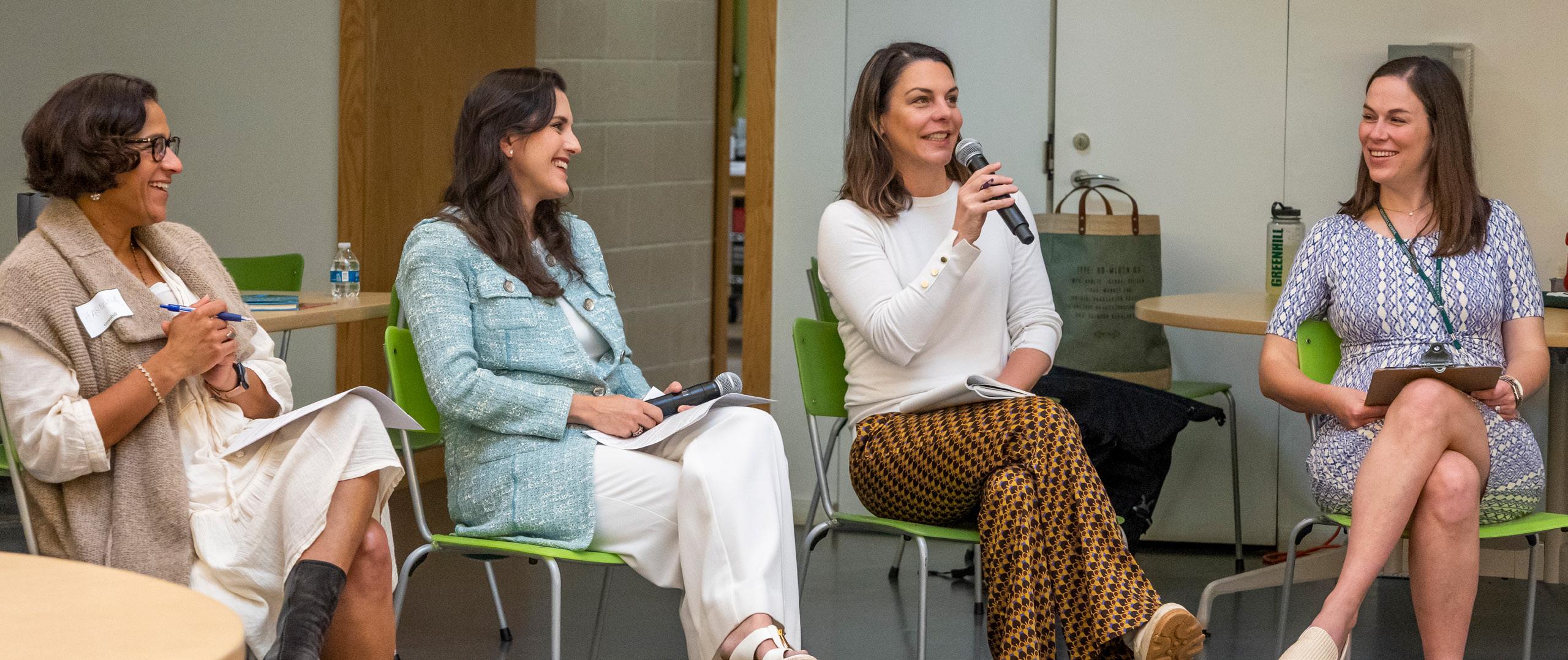
Listen to the value proposition they made for compassion here and check out the resources below. You are also welcome to join a half-hour follow-up conversation on Thursday, May 11 at 8:30 am by clicking here
What is Compassion?
What is Self-Compassion?
Making Caring Common
PLURAL COMMONS DIGEST 10
(from left to right) Haseena Enu, Einat Sadka, Natalie Nihill Ruberto ’00, and moderator Maggie Parry ’07
THE VALUE OF COMPASSION REFLECTIONS
FROM LEE HARK, FREDSTON HEAD OF SCHOOL
I want to thank the members of the Family Inclusion Council, the Parents Association, and the Office of Equity and Inclusion for making this event possible. And thanks to everyone here today for caring about this topic.
I wonder sometimes if compassion is our junior core value. Excellence speaks to our striving, our ambition, our high standards; Integrity to leadership, character, and honor. Courage to resilience and determination. Master those core values, and you can get somewhere; they will take you places. They’re marketable. They’re “life skills.” Considered separately, they are individualistic.
Compassion is a habit of the heart. It is something we extend to others. It involves tenderness and mercy and kindness. Compassion unveils our shared humanity. Compassion slows us down, requires that we consider others. And compassion exposes us. Compassion...can be a risk.
Compassion embodies not only a connection to the pain and misfortune of others but also a desire to alleviate these conditions. Compassion is active, not passive.
And like our other core values, compassion is an essential life skill, too. In our re-envisioning of our core values, it was the one from the last set that we chose again. We doubled down! Hopefully, that choice speaks to its centrality and importance in what it means to lead an authentic, purposeful life.
Our four core values aren’t meant to be developed in isolation; they are linked. When excellence, integrity, and courage are empowered by compassion, the impact of each is multiplied.
In those conversations when we were reframing our mission and core values, we wanted to capture a hope that the adults we were helping to create would be other-centered. That an authentic, purposeful life is fundamentally a compassionate one as well.
We are not a religious school, though many people in our community are people of faith. I think our emphasis on compassion is an attempt to connect to that. We do not follow a particular spiritual tradition, but we do acknowledge the importance of connecting to something larger than ourselves.
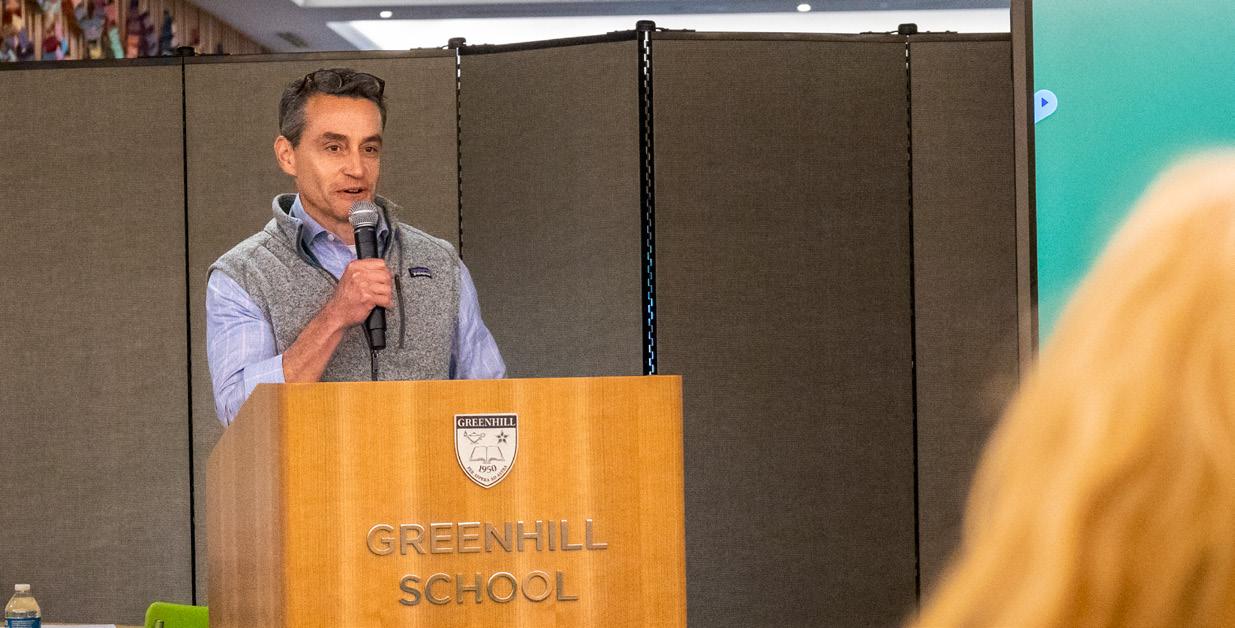
And I see evidence across the school that we are not particularly good at being compassionate. We need to be more thoughtful and intentional about training in this core value for our students and each other. I see this morning as a great example of what I hope we will do more of in the future.
I am grateful for this opportunity. Thank you.
SPRING 2023 11
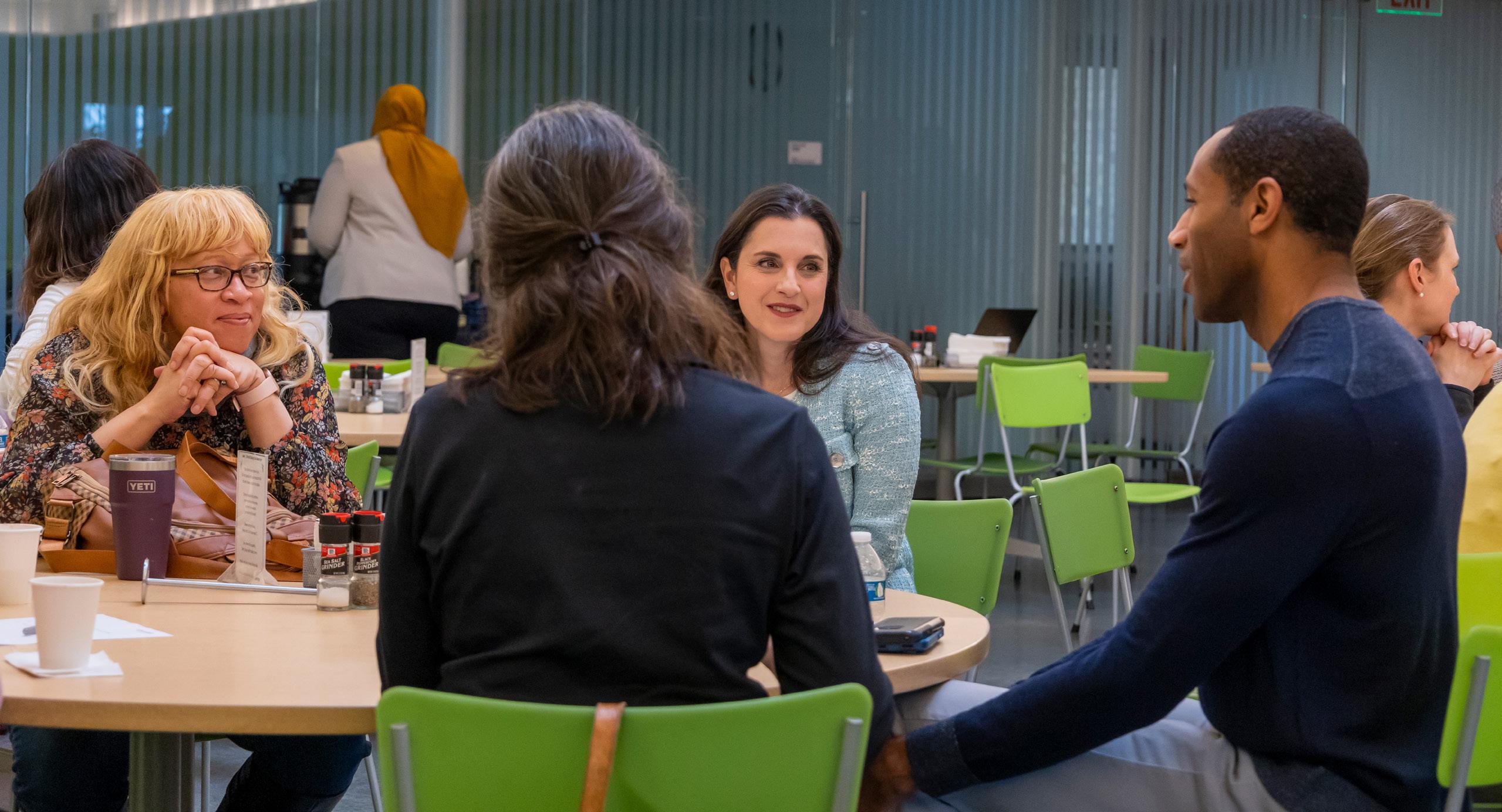
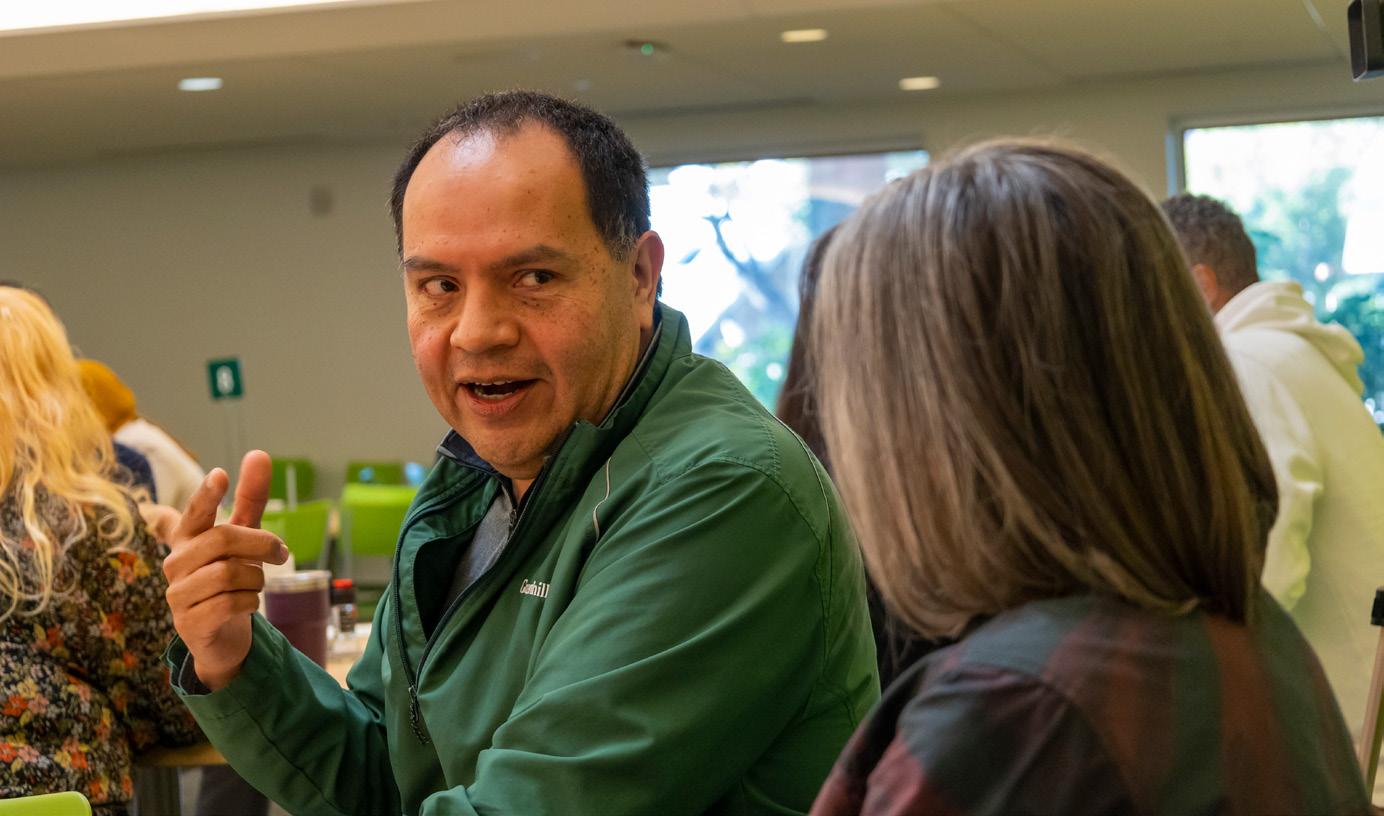
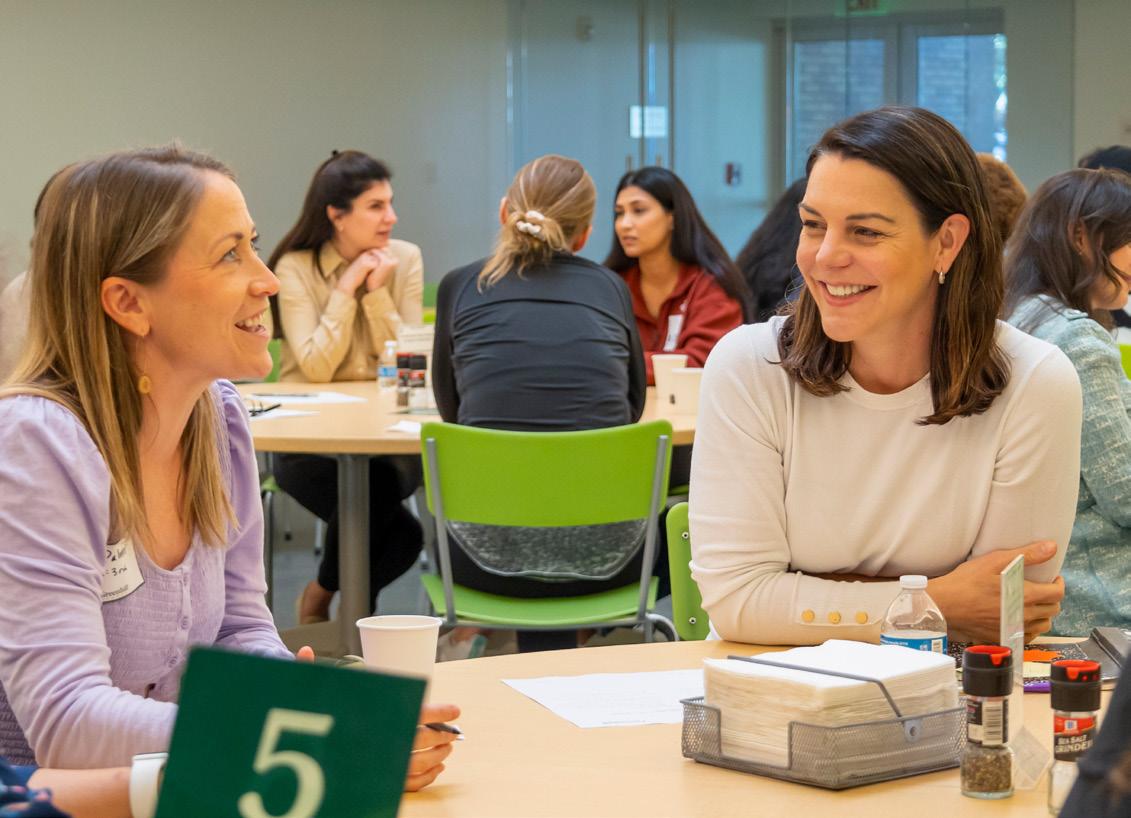
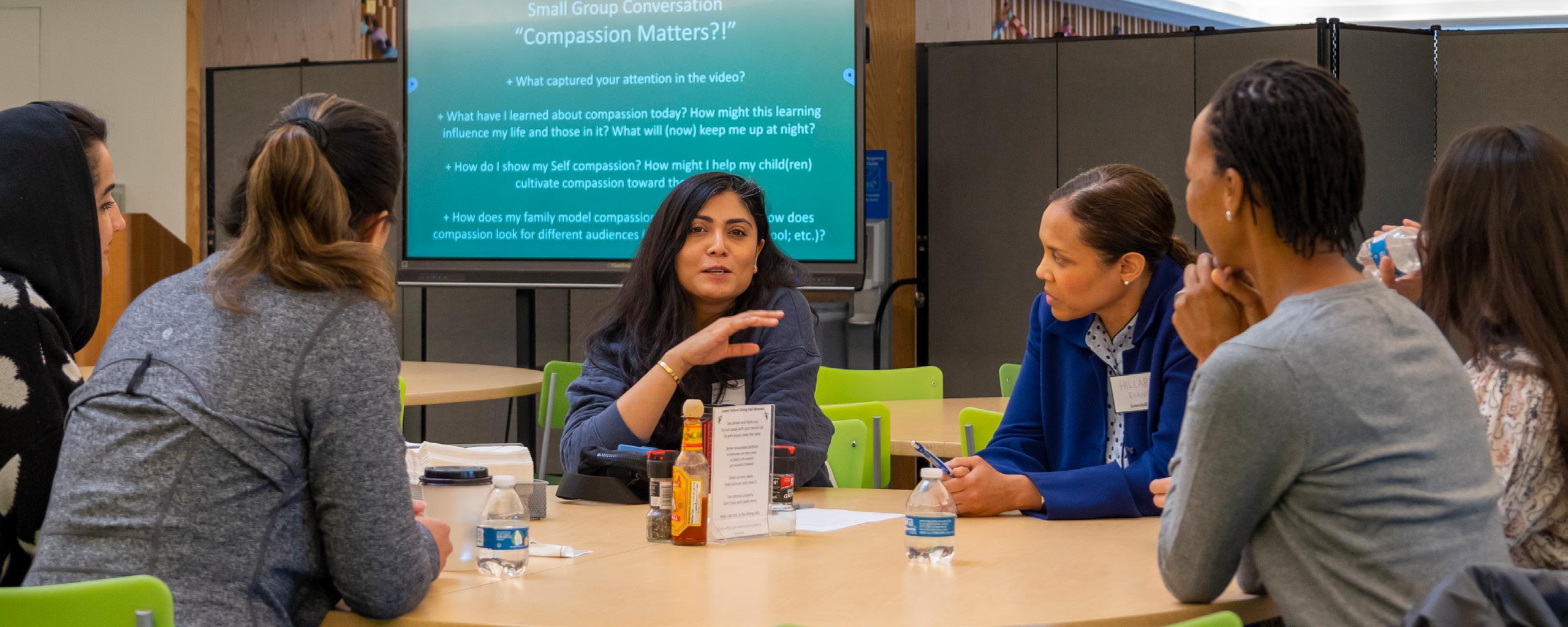 Greenhill parents/gaurdians gathered to explore the connection between compassion and inclusion.
Greenhill parents/gaurdians gathered to explore the connection between compassion and inclusion.
NEW MEMBERS OF THE FAMILY INCLUSION COUNCIL
The Family Inclusion Council (FIC) – an advisory group to the Office for Equity & Inclusion – was established in 2021. The membership of the Council seeks to represent our remarkably diverse family community and has parents/guardians from each academic division of the school and the Board. Each member of the Council serves a two-year term with an option for renewing service into a third year.
In March 2023, Greenhill invited five new members to join the Family Inclusion Council.
Yoon Chang: We are a new Greenhill family with a son in first grade and a younger son at Lamplighter. We moved to Dallas a few years ago from London. I am currently the Global and US Head of Strategy for Sodexo’s Healthcare & Seniors business, and I have been involved in various DE&I initiatives at my company over the last eight years. I am excited and looking forward to serving on the council.
Sara Hignite is an independent curator and art strategist who has worked in the art and nonprofit spheres for over 20 years. She currently serves on the advisory board of the future LGBTQ+ museum of Texas and has been highly involved in political and socialjustice activism. Sara’s child Fern is a sophomorethey’ve attended Greenhill since first grade.
Kaaz Naqvi is a professor of American Studies at UT-Dallas and a former upper school history teacher at Greenhill. He teaches courses on immigration, social movements, and the intersection of sports and society, among other topics. His daughter, Zameera, is presently in kindergarten.
Hi! My name is Maryam Rizvi! I have two children here at Greenhill, in Kindergarten and second grade. I was born and raised in Utah and love all things outdoors. As they say, you can take the girl outta the mountains, but you can’t take the mountains outta the girl! So excited to be a part of the FIC!
Einat Sadka: I am a mother of two teenagers, Ella, a new freshman at Greenhill, and Ethan, a seventh grader at Levine Academy. I am married to Gil Sadka, who is an Accounting Professor at UTD. I was born and raised in Israel and moved to the US in my mid-20s to pursue an MBA and a career in finance. I lived in Chicago, New York, and now Dallas and love it here. I am a Private Banker at Citi Private Bank. Most recently, I have been the co-head of the Diversity Operating Committee of the Private Bank where I co-lead a team of 300 volunteers promoting diversity, equity, and inclusion. I am looking forward to adding value to the FIC and contributing to the great work that Greenhill School has been doing.
Yoon, Sara, Kaaz, Maryam, and Einat join returning FIC members: Melody Akhavan (parent ’34); Maria Chahrour (parent ’29, ’32); Kamini Mamdani (parent ’23, ’28); and Marlo Melucci (parent ’24, ’25).
A special thank you goes to Alana Taylor (parent ’28) and Jonathan Welsh (parent ’32) who are finishing their terms as inaugural members of the Council.
SPRING 2023 13
LEADERSHIP: AN ORIGIN STORY
Fourth-Grade Students
The idea of leadership and the question of how to be a great leader guide much of what we do in fourth grade. Whether we are directly analyzing the actions of historic leaders, helping others by volunteering at carpool, or taking ownership and responsibility for our learning, fourth graders have many opportunities to explore what it means to be a leader and start to develop their own style of leadership.
The origin of the theme of leadership in fourth grade is linked to Helen Misura, who served as the first Head of Lower School from 1950 – 1969. While there are no remaining members of the faculty who can recall exactly when “leadership” became an anchor for our most senior Lower School students, its reach has continued to grow and take shape over time.
For example, in the early 2000s, fourth graders began volunteering for afternoon carpool curb duty; in 2007, fourth graders took on the role of leading weekly Lower School assemblies. Not long after that, they formed a “Green Team” to help keep

our campus clean and support recycling efforts. Whatever the idea or curricular adjustment, the vision, talent, and passion of fourth-grade teachers make the difference.
We read and complete activities from Sean Covey’s 7 Habits of Happy Kids each school year. These habits cover both intrapersonal and interpersonal skills such as being proactive, listening before speaking, and taking care of mind, body, and soul. The Persuasive Letter unit is a great example of how these skills are woven into the curriculum and how students lead their learning. During the unit, students explore problems that affect themselves, their community, and the world; they then research and write to an authentic audience with their proposed solutions. Taking on these problems and proposing changes allows students the opportunity to practice leadership.
Some of our fourth graders had this to say about leadership.
PLURAL COMMONS DIGEST 14
Michael Simpson Head of Preschool and Lower School
Brittany Griggs ’09 Fourth-Grade Teacher
LEADERSHIP AS FINDING VOICE
Eighth-Grade Students
Leadership in Middle School is a funny thing, both awkward and completely natural at any given moment; in many ways, it can be described as students practicing the art of finding their voice. Through a variety of student-centered initiatives, we are empowering our students to be influential leaders who know how to learn new skills and maximize existing ones.
As mentioned in The Hill, Student Forum has been reconfigured as Student Advisory Boards. Any seventh- or eighth-grade student can join a board, and the choices are Academics, Arts, Athletics, Service, and Lifestyle. The results of their collaborative work have consistently spotlighted student initiative and commitment to the school, anything from greeting and touring prospective families and teaching candidates to producing an entire Middle School assembly centered on the arts.
Furthermore, we have revived the Middle School literary magazine, now called New Horizons, and its student production team recently presented its publication process in a faculty meeting. The Middle School service club of fifth and sixth graders assembled 50 care bags for those experiencing homelessness, an entirely studentdriven project.
Middle School leadership summons a host of qualities – passion, compassion, commitment, initiative, resilience, grit, inclusivity, curiosity, humility, confidence, and more. This (st)age of development also invites students to decide between doing the right thing and the cool thing when they don’t seem to be the same.
Indeed, Middle Schoolers are finding their voice in a variety of ways. Here is what some of them had to say about leadership.

SPRING 2023 15
Susan Palmer Head of Middle School
Susan Bauman ’81 Eighth-Grade Team Leader
AN AFFINITY FOR LEADERSHIP
Monsie Muñoz ’05
Associate Director of Equity & Inclusion Upper School English Teacher
Learner. Achiever. Intellection. Individualization. Responsibility.
What do these five words have in common?
Me.
They are my top five CliftonStrengths, which are derived from a research-based assessment tool to identify one’s top talents from a group of 34 themes. According to April Burns, Upper School Spanish Teacher and CliftonStrengths Coach, “I see CliftonStrengths as a common language [that helps] bring people together [by] focusing on what they
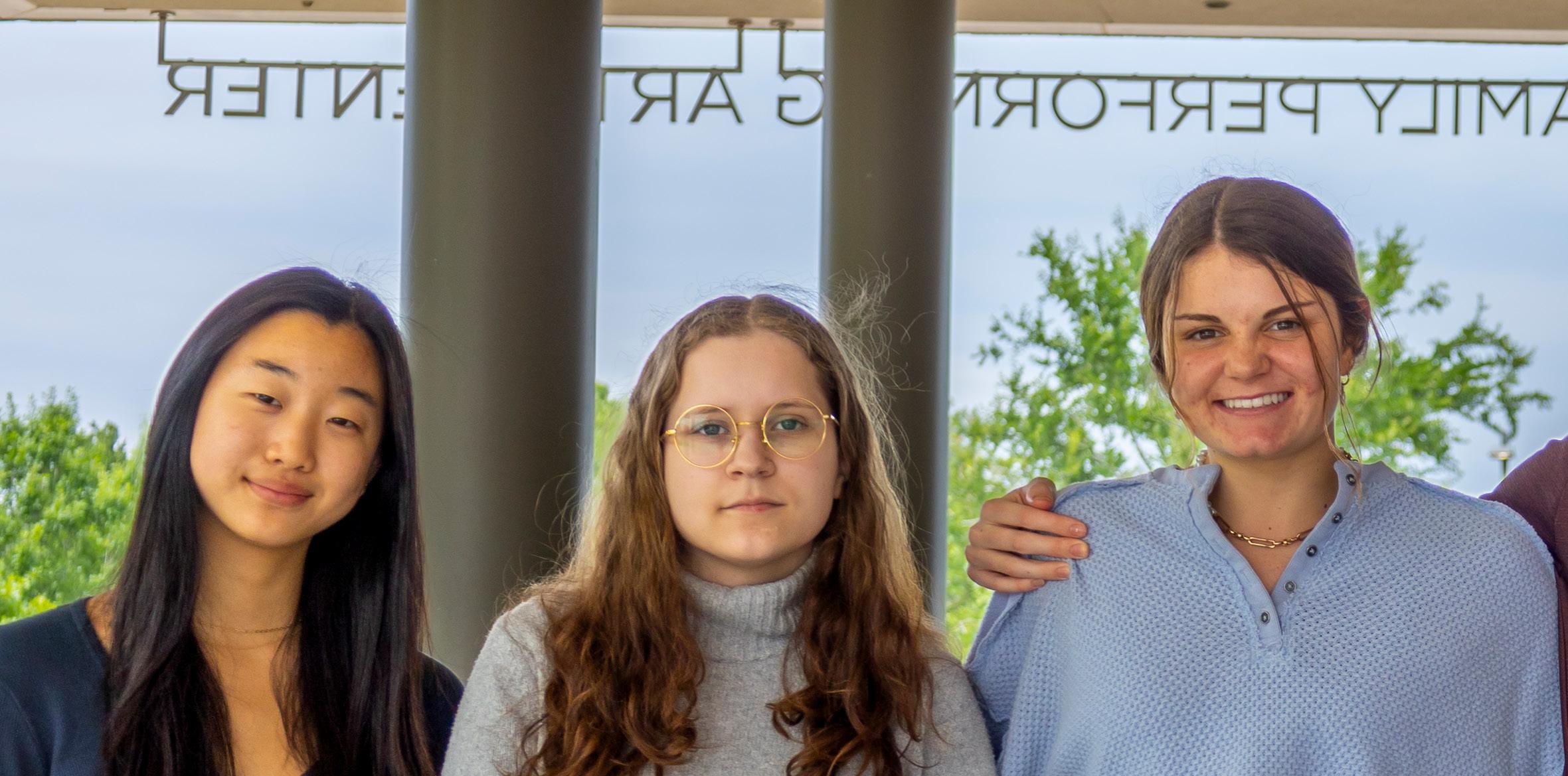
do well. It also requires people to have a certain amount of self-awareness and an understanding that forming complementary dynamics is essential to working well as a team.”
With this in mind, we decided to pilot an opportunity for students in Affinity Group leadership roles to take the assessment and receive coaching about their results from Ms. Burns. This spring, we had students from 10 different Affinity Groups express interest, and we moved forward with organizing the assessment and coaching sessions.
Aaron Johnson ’23 celebrated the shared vocabulary
PLURAL COMMONS DIGEST 16
that the CliftonStrengths assessment provides: “The five skills strengths I received in my report explain a lot about me that I don’t think I could’ve accurately expressed before taking the test. By leveraging these skills, I can become a more effective leader and use my strengths in any organization I’m a part of.”
Most students also found that they were able to communicate their unique approach to different scenarios with more confidence and detail after taking part in this program. Fern Hignite ’25 said, “It made me happy to put specific names to my best traits and made me feel more confident in my strengths.” Ayn Park ’24 believes that, “By knowing what my top five are and understanding how to cultivate them, I think that I can be a better leader in my affinity space. I’ll know which tasks I can handle with my skill set and who to collaborate with if I need extra help.”
A focus on learning how to maximize strengths in problem-solving and growth seem top of mind for some students in the group. Kevin Han ’23 observed,
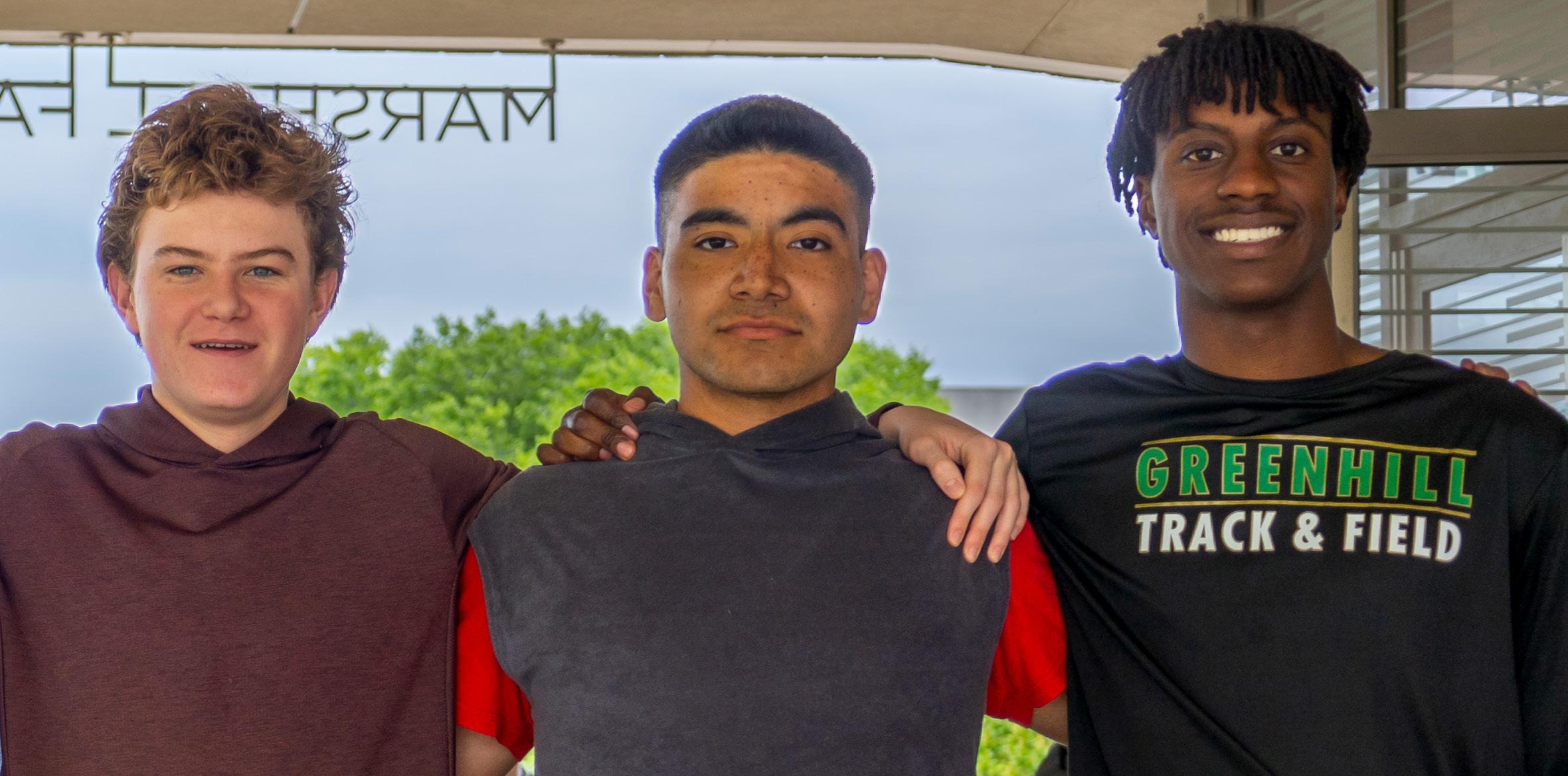
“I may in my future use this information to focus my efforts on what I know I do better.” Santiago Lopez ’24 is looking to apply his leadership skills in as many areas of his academic and extracurricular life as possible, including his future role as a stage manager.
Josie Arbuckle ’24 says it well, “What I learned will impact my time at Greenhill and beyond. I now am equipped with the self-awareness to develop into a more effective leader who understands their strengths and is able to cultivate a positive and productive environment.”
The evident success of this pilot initiative in supporting student leadership means that we will extend the opportunity for CliftonStrengths assessment and coaching to more students next school year. And, we have plans to offer the opportunity to Affinity Group adult sponsors to enhance their ability to guide student growth and development. Stay tuned.
SPRING 2023 17
(from left to right) Ayn Park ’24, Fern Hignite ’25, Josie Arbuckle ’24, J.J. Arbuckle ’25, Santiago Lopez ’24, and Aaron Johnson ’23
GROUNDED LEADERSHIP AN INTERVIEW WITH KARA SMITH AND TREY COLVIN
Greenhill’s Summer Enrichment Grant (SEG) program was launched in 2022. The program provides faculty and staff with a collaborative opportunity to design strategies that respond to institutional needs and enrich the school. Projects can focus on any area of school life – academic, equity and inclusion, social, artistic, athletic, service, and technological – and are expected to go beyond “typical” professional development. Gretchen Pollom (MS Science), Susan Eve (MS Science), Kara Smith (MS History), Trey Colvin (US English), and Regina Yunker (MS History) initiated a project to help students understand natural systems and recognize the value of natural habitats.
Gretchen, Susan, Kara, Trey, and Regina have sought to cultivate respect for our campus grounds with an eye toward helping Greenhill become a leader in environmental sustainability, effective land stewardship, and outdoor education. When asked what they hoped our community learned from the land, Kara said, “Not only can we learn more about the land and nature itself, but time in the gardens also helps us to cultivate deeper understandings about ourselves and our connectivity to both the land and each other.” Trey said, “I am fond of saying that we all would do well to remember that we are a part of the ecosystem, not apart from it. Choices we make, even small ones, can have a huge impact.”
Keep reading to learn more from Trey and Kara about how their SEG initiative has inspired their and our students’ leadership.
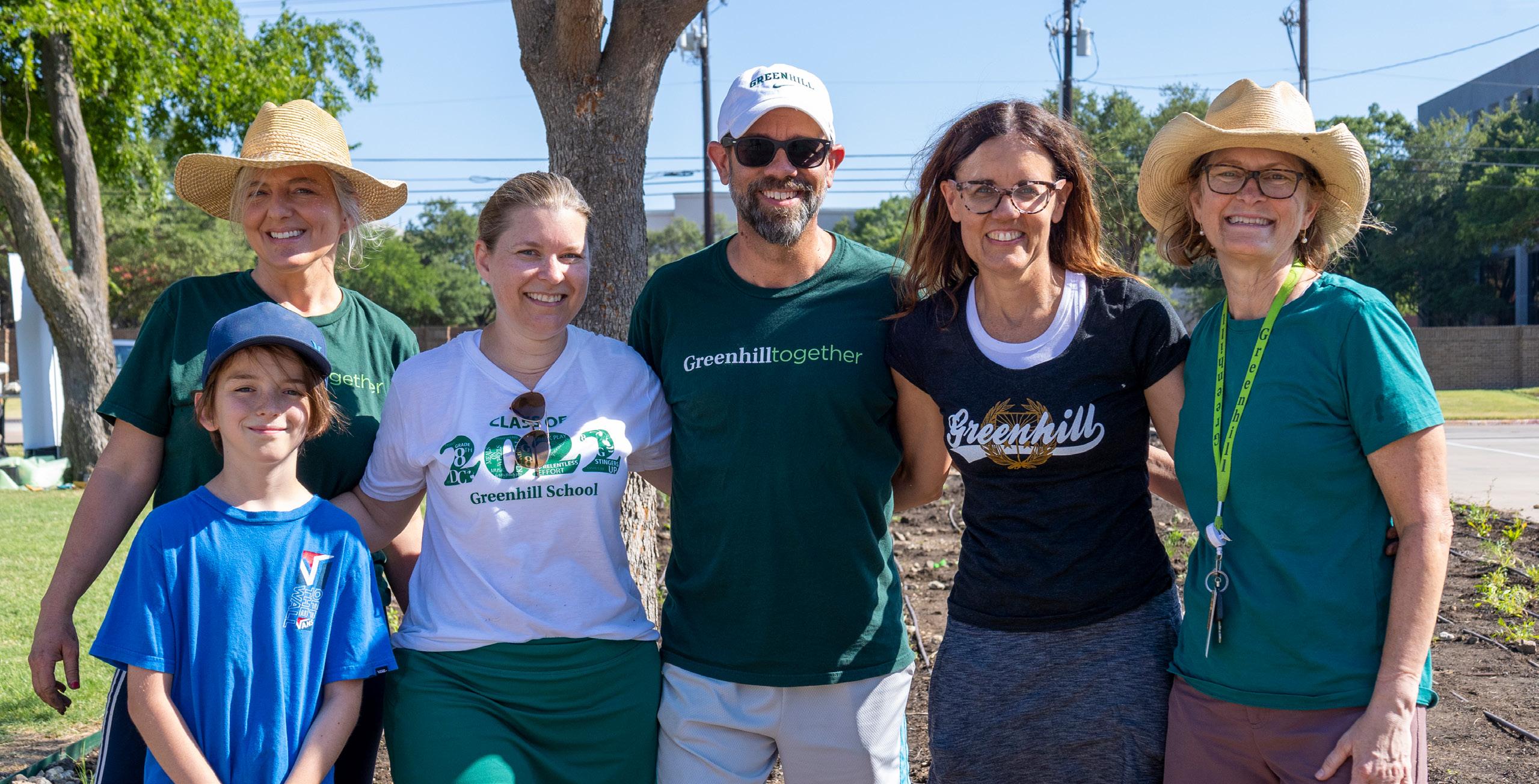
PLURAL COMMONS DIGEST 18
What is the origin story of your work with reviving the Blackland Prairie and its indigenous plantings on the Greenhill campus?
KS: I jumped at the opportunity to work with this group as part of the Sustainability SEG last summer (and again this summer!). They all have a wealth of knowledge and experience in their fields and in the broader community, a genuine love for nature and our school community, and they are just positive and inspiring human beings with whom to work! With sustainability as our driving focus, it was only natural that the gardens planted would contain plants indigenous to the area.
During our summer work, we had the opportunity to engage in “learning walks” on and off campus for inspiration. One place we visited was the Botanical Research Institute of Texas (BRIT) in Fort Worth and their water conservation and pollinator gardens and herbarium. That was an eye-opening experience for me – to see the potential we have here at Greenhill to revive the natural state of our campus and how many doors to educational, community/connection, and sustainability opportunities it could open. The pollinator garden off Hornet Road is one example of such an opportunity and came out of the leadership of our Master Naturalists, Gretchen and Trey, and a partnership with the Texas Conservation Alliance. It has been a treat to see its growth in this last year. Hopefully, this is just the beginning!
TC: I first began learning about our native ecoregion in 2009 when I worked on a project creating a Blackland Prairie field guide for the Lake Lewisville Environmental Learning Area as part of my Texas Master Naturalist certification. When Gretchen approached me about making a pollinator garden on campus, I was eager to partner with her to make it happen. We spent a lot of time identifying other areas on campus where we might use native plants to create a series of outdoor learning spaces for
our students. We realized that using more native plants would help reduce erosion on campus and improve the soil quality, so we set about researching resources and making contacts with the Town of Addison, hoping to get their support for replacing as much of our existing ornamental landscaping into native landscaping. With support from Fredston Head of School Lee Hark, Associate Head of School/CFO/ COO Kendra Grace, and Associate Head of School for Mission, Community, and Culture Tom Perryman ’81, as well as from the Director of Parks for the Town of Addison, we were able to identify almost 70 areas on campus we could improve. At that point, our project started growing beyond creating a single pollinator garden. We planted almost 500 plants in various locations last summer and another 200 in October. Recently, the pollinator garden was designated a Certified Schoolyard Habitat by the National Wildlife Federation.
How is this effort an expression of the leadership you hope to provide in our School community?
TC: Gretchen and I share a vision of making Greenhill School the leader in environmental sustainability, effective land stewardship, and outdoor education in the Dallas area. We intend to create a model other schools might implement to transform their campuses using sustainable landscaping practices. Additionally, we hope to inspire our community to learn more about their region’s ecological heritage. Since beginning the project, scores of parents, students, and colleagues have asked us for recommendations for using native plants in their home landscapes. The response we have received from the community has been remarkable. We have ignited a native plant revolution of sorts.
KS: It’s all about creating connections. The school theme this year could not have been more timely. There is so much we can learn from one another when we take the time to roll up our sleeves and
SPRING 2023 19
get to know one another. The gardens bring people together; I’ve experienced it first-hand. Whether bringing together an SEG team, faculty, staff, administration, parents, and students – current, former, and future – some great ideas, opportunities, and partnerships have been generated from walks and talks in the garden.
As you have involved students, how have you seen them express their leadership?
KS: While I have had the opportunity to help with various garden beds across campus, I have also been able to put some of our ideas about sustainability and the curriculum in place in the classroom (this was another focus of our SEG group). Collaborating with the eighth-grade science departments, our history students are currently working on a cross-curricular research project focusing on a modern environmental challenge. In May, they will host a Climate Summit where they will present their body of research (research completed in history class) and an end product (generated in science class) that is focused on a solution to the environmental challenge. While students will present to their peers, seventh-grade students will also be invited to the summit. In this
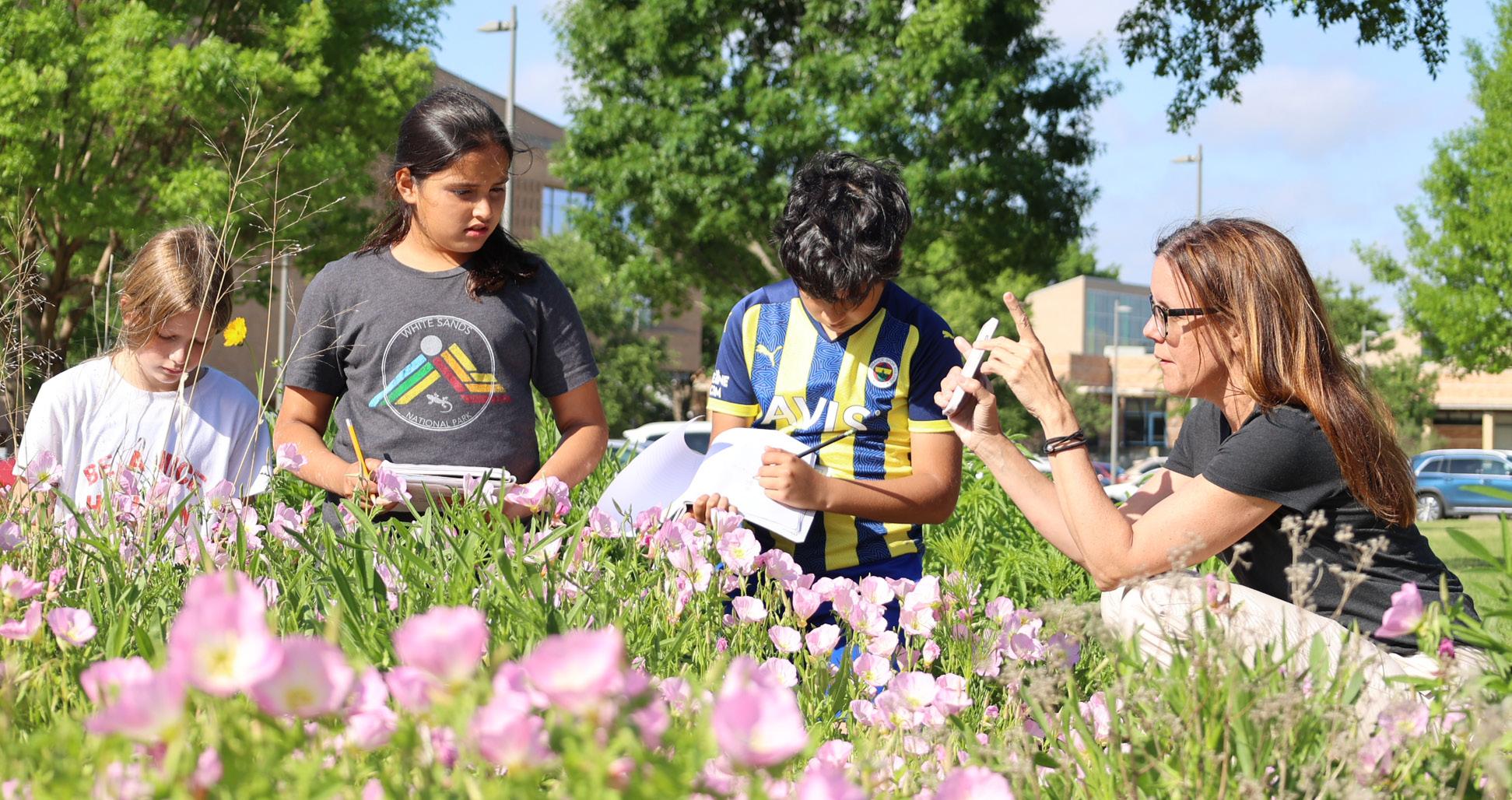
way, and in the sense that students are becoming empowered to seek avenues for action, our students are becoming active agents for change and learning how to lead others in better understanding and creating solutions for challenges around us. This project is just in its inaugural year; however, students have already taken the opportunity to really lean into topics of interest to cultivate a deeper understanding of why these problems exist and run with them to consider how they can create solutions that will make a difference. In the future, we hope to incorporate even more disciplines into the culminating project.
TC: I want to create an army of student volunteers as the project continues to grow. My vision is to offer on-campus community service opportunities for Upper School students beginning next year. As more students learn about what we are doing, so many have expressed their desire to be a part of it. This year was mainly about building an infrastructure and identifying ways for those students to get involved. Ultimately, the project is about educating students to understand natural systems and to recognize the value of natural habitats; also, we hope to inspire students to be responsible stewards of our campus native resources.
What do you hope we learn from the land?
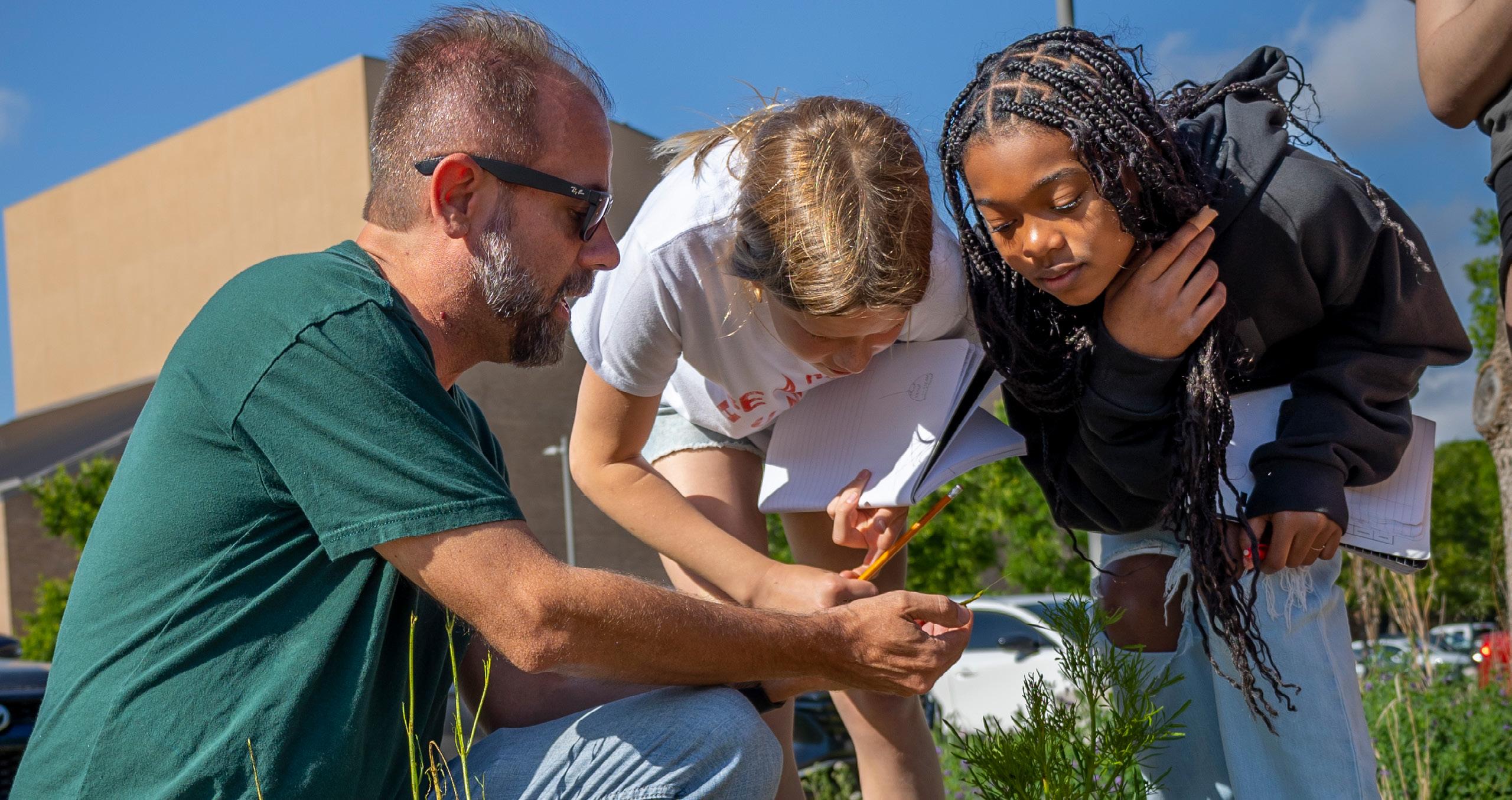
KS: I hope we learn to be better stewards of landthis land, all land, period. How fortunate we are here at Greenhill to get to learn on these 75 acres. Not only can we learn more about the land and nature itself, but time in the gardens also helps us to cultivate deeper understandings about ourselves and our connectivity to both the land and each other.
TC: The Blackland Prairie once stretched from the Red River to San Antonio. Today, less than 1/10th of 1% of it remains untouched. It is no exaggeration to call it the most endangered ecoregion in the world. We can talk about “saving the rainforest” or about “saving coral reefs;” however, because of urban development, there is no saving the Blackland Prairie. It will never be restored to its original form. The best we can do is to preserve as much of it as we can and to create “pocket prairies” throughout the region. Prairies play an important role in water conservation. Many prairie grasses are perennial, and they have very deep and extensive root systems. During a drought, the roots draw water from deep underground, allowing the grasses to survive. In
addition, prairie grasses help water soak into the ground, which resupplies groundwater and reduces flash flooding. When heavy rains dump tremendous amounts of water in an area, the grasses hold onto the dirt and help the soil absorb the water. This prevents erosion, which is a major problem because it destroys soil fertility and causes reservoirs to gradually fill with mud. If area reservoirs become filled with mud and other sediments, they become less useful for storing water.
I hope people will learn that everything in an ecosystem is connected to everything else. Every choice we make has an impact. Sometimes the impact is easy to see – an increase in butterflies on campus for instance. More often, though, the impact is subtle and hidden, yet creates a cascade of problems. I am fond of saying that we all would do well to remember that we are a part of the ecosystem, not apart from it. Choices we make, even small ones, can have a huge impact.
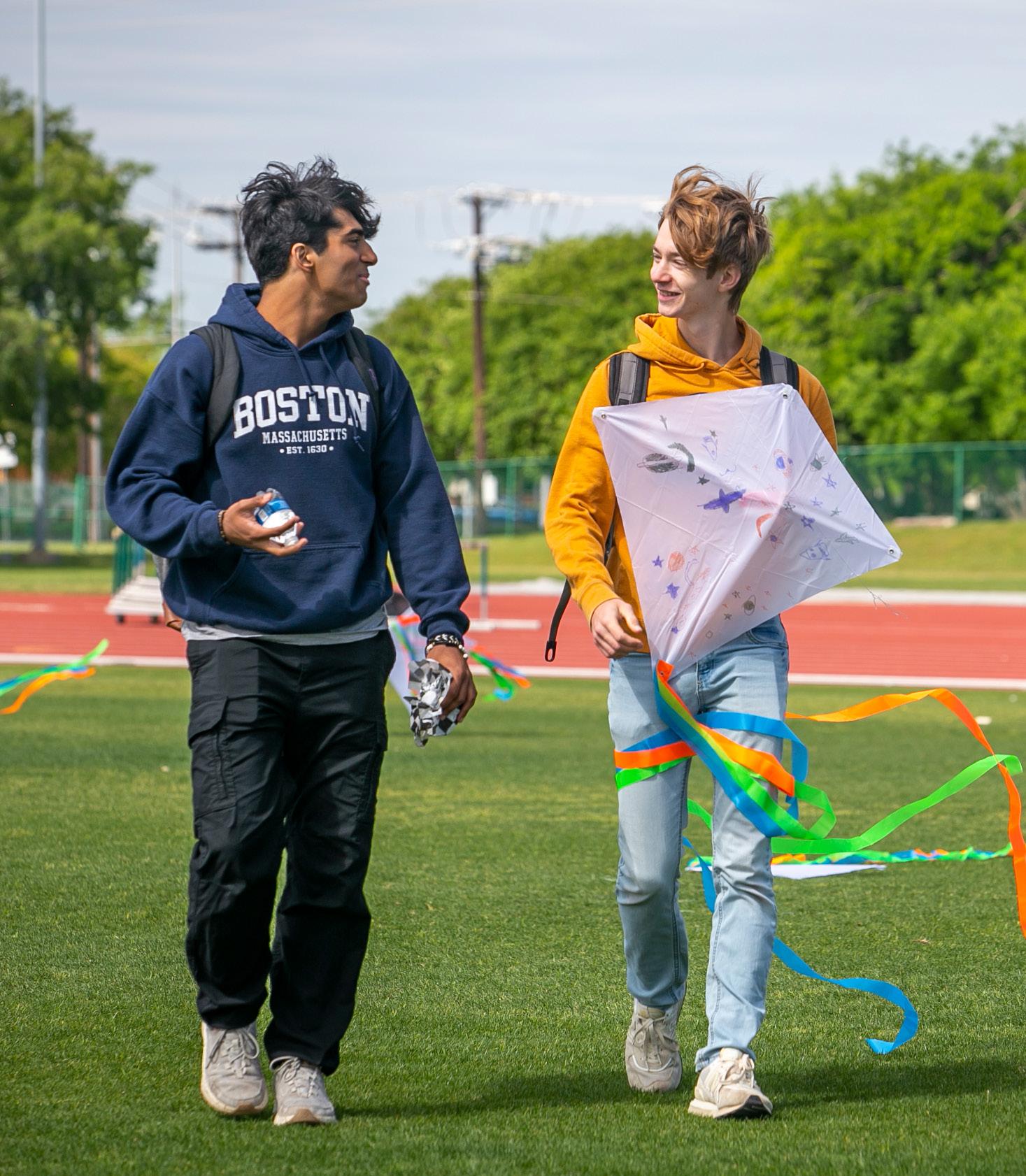
4141 Spring Valley Road, Addison, TX 75001 | www.greenhill.org | 972-628-5400


 Above: Lower School students studied monarch butterflies and prepared for the migrating pollinators by growing milkweed plants in their garden and learning about the super-species.
Above: Lower School students studied monarch butterflies and prepared for the migrating pollinators by growing milkweed plants in their garden and learning about the super-species.

















 Greenhill parents/gaurdians gathered to explore the connection between compassion and inclusion.
Greenhill parents/gaurdians gathered to explore the connection between compassion and inclusion.







